108 Important Historical Images That Might Change Your Perspective On Things, As Shared By This Instagram Page
Historical pictures are likely the closest thing to time travel we have so far. From family gatherings to crucial events such as human rights demonstrations, they can be revisited thanks to photographers who decided to document them.
The Instagram account “Historical Leaks” shares some of the most interesting images from different periods of the past. Their educational and often awe-inspiring content has already gathered thousands of followers and continues to grow people’s interest in history. Scroll down for the pictures and feel free to upvote your favorites.
Bored Panda has reached out to “Historical Leaks” via Instagram and will update the article once we've heard back from them.
P.S. Make sure to check out their previous Instagram account for more interesting photos.
#1 Two Young Men Hold A Pre-Printed Sign Proclaiming Their Bond And Willingness To Be Legally Wed To One Another, Circa 1900
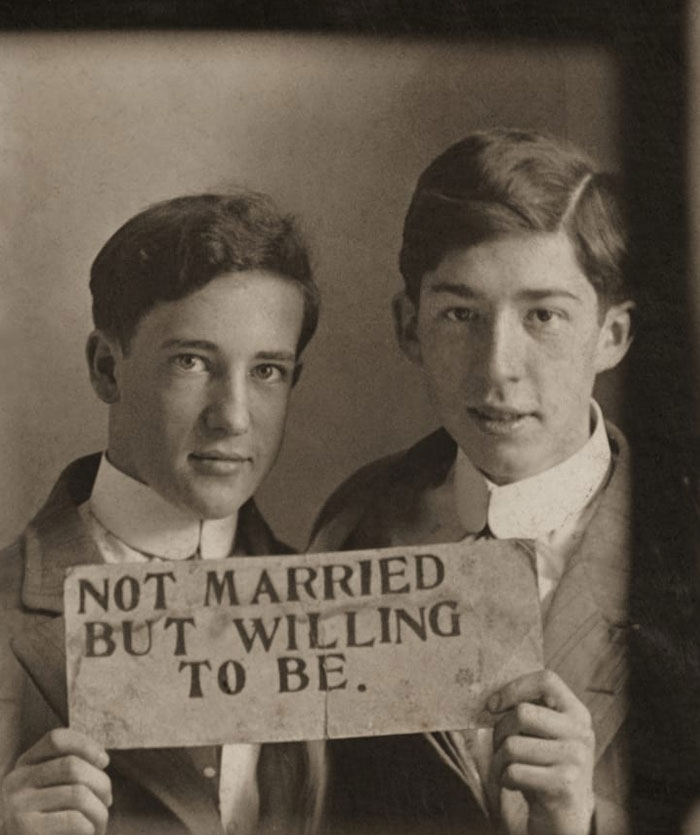
Image credits: historicaleaks
It is not only the visual representation of history in pictures that is captivating, but also the history of photography itself. It has come a long way from a box with a hole to a phone camera producing images of nearly professional quality.
You can trace the beginning of it to a thing known as Camera obscura. Translated from Latin, it means “dark room”, which is exactly what it is. The term describes a dark chamber with a small hole in one of the walls, which becomes the only source of light. The wall opposite the opening then projects an inverted image of the setting behind the hole.
Camera obscura became the foundation for a smaller, pocket-friendly version called a pinhole camera. It uses the same principle, but instead of a room, all you need is a small box with a dark-colored interior and a hole for the light to come through.
#2 In 1996, A Newborn Baby Girl Was Left In A Garbage Can Near The City Of Kolkata, India
Three friendly street dogs discovered and protected her for nearly two days, even attempting to feed the child before authorities were contacted and the young one was saved.
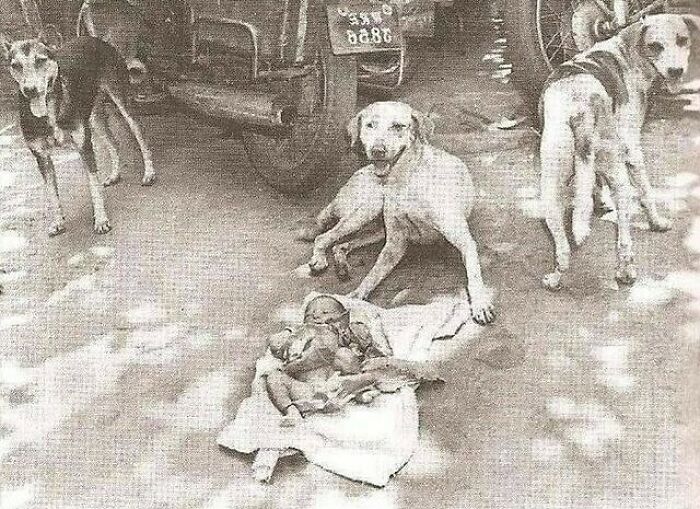
Image credits: historicaleaks
#3 A Dissatisfied Dental Patient, 1920s
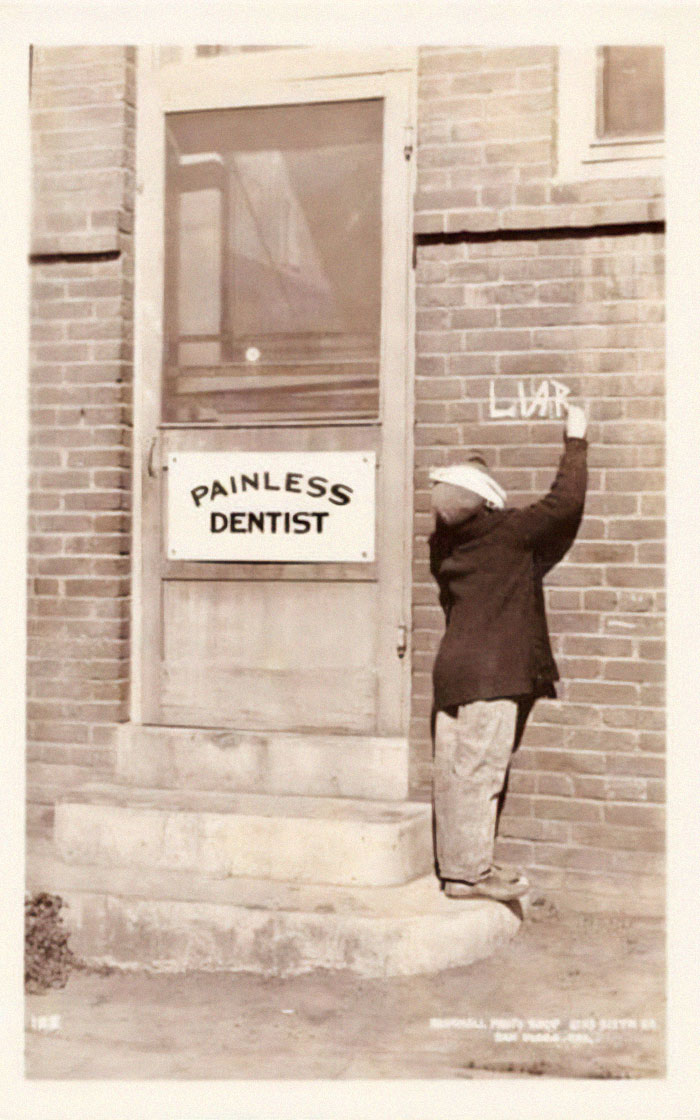
Image credits: historicaleaks
A pinhole camera was later developed with the help of an angled mirror that flipped the inverted view. However, that was not yet a picture as there was no way to imprint the image.
The first photograph ever taken is attributed to the French scientist Joseph Nicéphore Niépce. He was the mastermind behind heliography, a process of using sunlight to draw. By developing the technique, J. N. Niépce was eventually able to produce an image using a pewter plate. In 1826, he took the photograph “View from the Window at Le Gras” which some consider to be the start of modern photography.
#4 The Eruption Of Mount St. Helens, 1980
Some background info by a friend of the man who took this photo: "He pulled some background info by a friend of the man who took this photo: "He pulled over and attempted to turn around seeing as the ash cloud was heading his way and fast. In his hurry he bent the forks on his motorcycle. He jumped out of the car and ran up the hillside to get some pics, thinking he might just die for it, and hoping someone would find the camera at least as it was a phenomomenal sight that filled the sky. The first picture he took was the one with the Pinto cocked in the road and the bent motorcycle still in the back with that HUGE cloud going up in the sky in the background. He made his way back down the mountain after being quickly overtaken by the ash cloud. He was completely blinded, and had to drive on the opposite side of the road steering by staying right on the opposite side of the road heading into oncoming traffic, but encountered nobody going up. The car choked out after a while and he rode his bent motorcycle out of the mountains back to the room he had rented. The next day as soon as he could, he rode his motorcycle back up into the now really hot zone with his camera to get what pics he could. He was well into the red no go zone, when a helicopter saw him, and came right down and landed in his path. He was surprised to be arrested on the spot and flown out in the chopper and to jail. They left his motorcycle lay on the mountain. They also kept him in jail for a few days without letting him call anyone or even plead his case. When he finally got out, he again went back up there, (Not sure how) and was able to get his motorcycle back and I think later his car as well."

Image credits: historicaleaks
#5 Kindergarten Children Were Asked On Father’s Day To Draw From The Memory Portraits Of Their Dads, And Then Compared Them To The Original, Life Magazine, USA, 1949
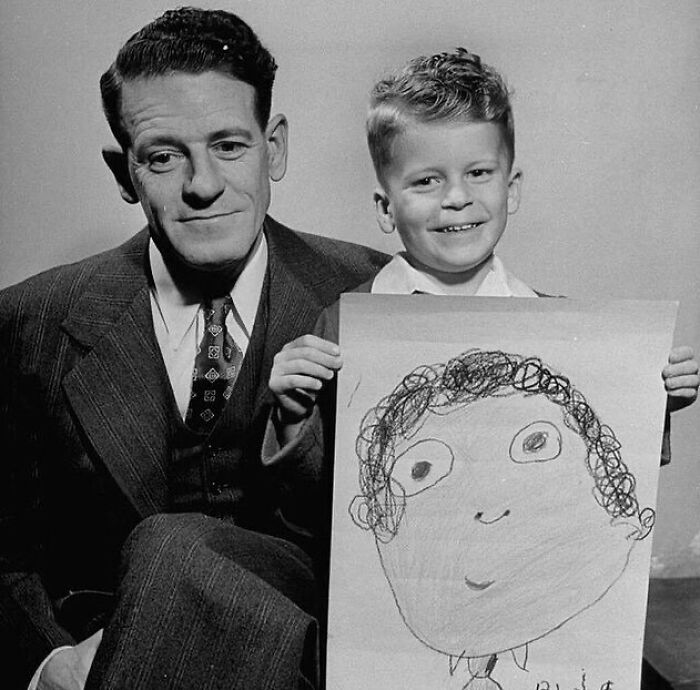
Image credits: historicaleaks
J. N. Niépce continued to develop the technique with the help of a French inventor, Louis Daguerre. After Niépce’s sudden death, his colleague carried on working with heliography. Eventually, he presented an approach of his own, known as the daguerreotype process. It allowed him to produce images in physical form using a silvered copper plate and chemical reactions.
#6 Theodore Roosevelt’s Diary Entry On Valentine’s Day, After His Wife And Mother Died Within Hours Of Each Other On The Same Day, 1884. He Wrote:’x.. The Light Has Gone Out Of My Life.’
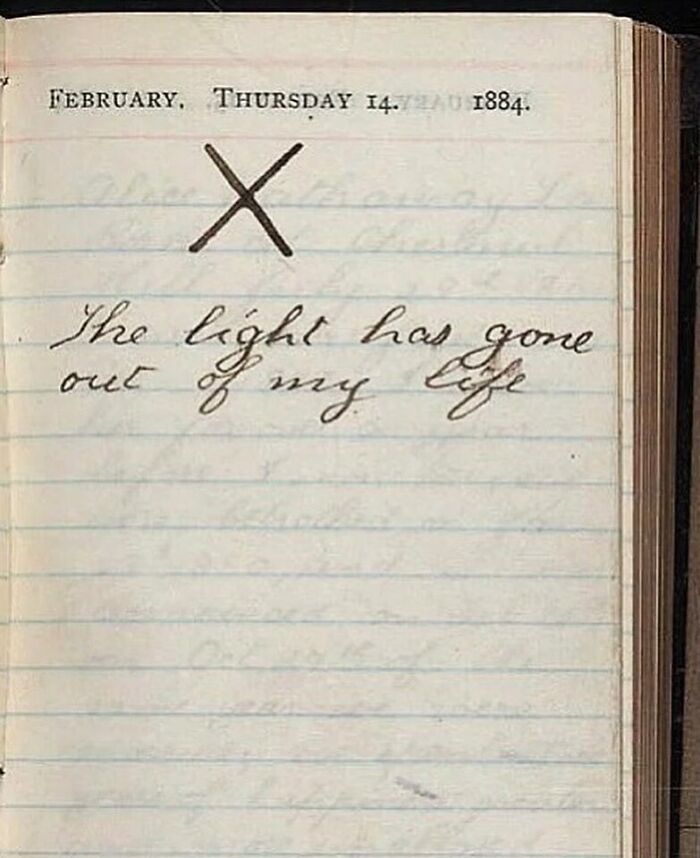
Image credits: historicaleaks
#7 The Date Was August 8, 1982. The Red Sox Were Playing An Afternoon Game At Boston's Fenway Park
Suddenly a screaming foul ball whizzed past the first base dugout and Red Sox left fielder Jim Rice heard the unmistakable sound of ball striking flesh. Looking around the corner of the dugout into the stands Rice saw 4 year old Jonathan Keane bleeding profusely from his head. Realizing in a split second that it would take several minutes for park EMT's to get to the scene, the future Hall of Famer sprang into action. Rice leaped over the railing into the stands, cradled the young fan into his arms and carried the boy into the dugout where he received immediate attention from the team's medical staff. Within just a few minutes Jonathan was rushed to the hospital where doctors credited Rice with saving the boys life. Jim Rice played the rest of the game in a blood stained uniform, a true badge of courage
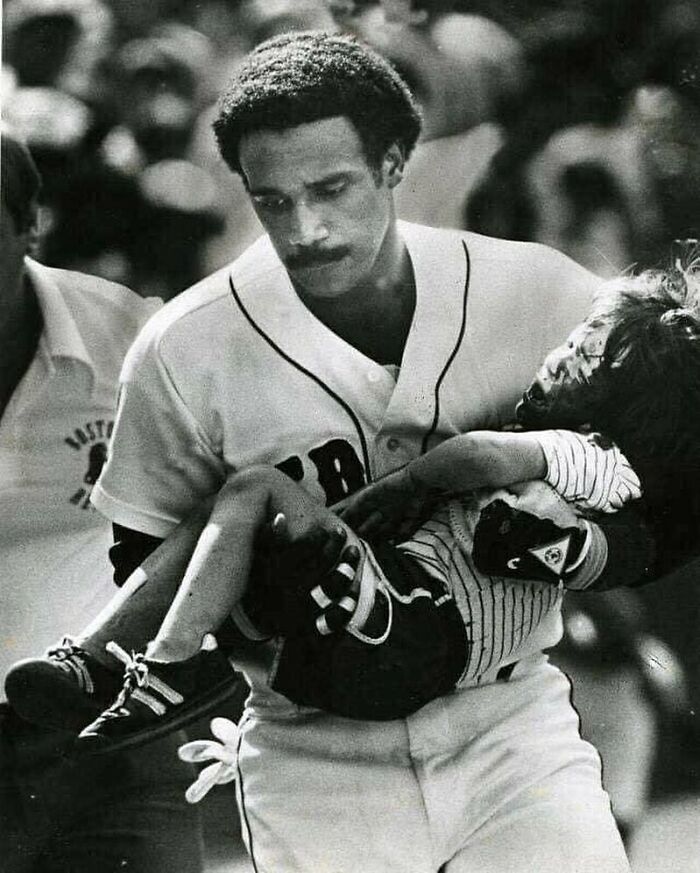
Image credits: historicaleaks
#8 A Highland New Guinean’s Reaction To Seeing A White Person For The First Time In His Life, 1930. Before This, They Thought They Were The Only Living People In The World
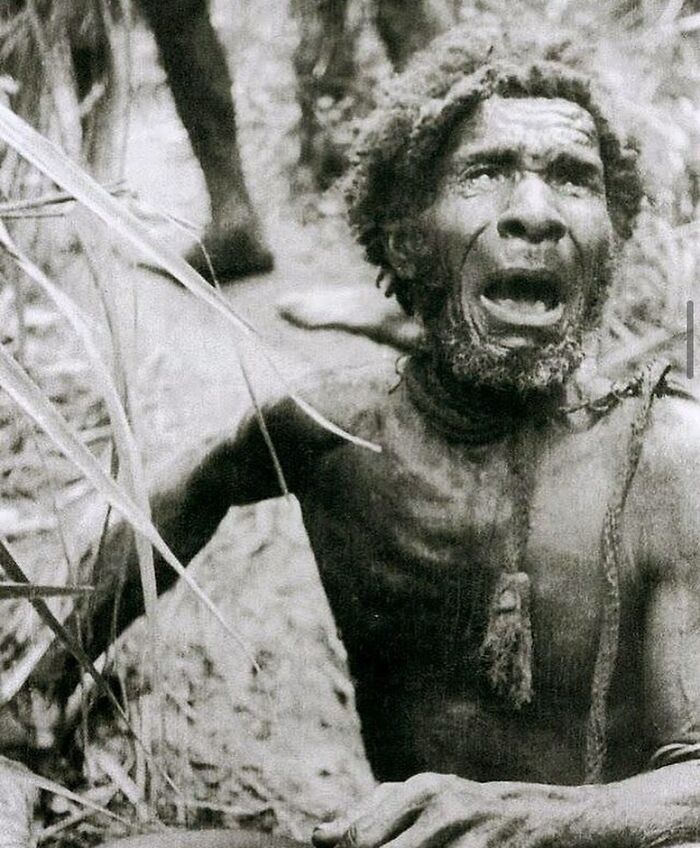
Image credits: historicaleaks
Further development of photography was pretty rapid. It only took around two hundred years to go from a box with a hole to your grandmother taking pictures with her phone. And they’re better than the professional ones in her days.
Research shows that nowadays people only take 7% of pictures with their cameras and use smartphones for 92.5%. It also unveiled that a person stores an average of 2,100 pictures on their phone.
#9 The Kiss Of Life - A Utility Worker Giving Mouth-To-Mouth To Co-Worker After He Contacted A High Voltage Wire, 1967
Taken in 1967 by Rocco Morabito, this photo called "The Kiss of Life" shows a utility worker named J.D. Thompson giving mouth-to-mouth to co-worker Randall G. Champion after he went unconscious following contact with a low voltage line. They had been performing routine maintenance when Champion brushed one of the low voltage lines at the very top of the utility pole. His safety harness prevented a fall, and Thompson, who had been ascending below him, quickly reached him and performed mouth-to-mouth resuscitation. He was unable to perform CPR given the circumstances, but continued breathing into Champion´s lungs until he felt a slight pulse, then unbluckled his harness and descended with him on his shoulder. Thompson and another worker administered CPR on the ground, and Champion was moderately revived by the time paramedics arrived, eventually making a full recovery. What´s even more incredible is Champion not only survived this thanks to Thompson, but he lived an extra 35 years. He died in 2002 at 64 years old. Thompson is still alive today.
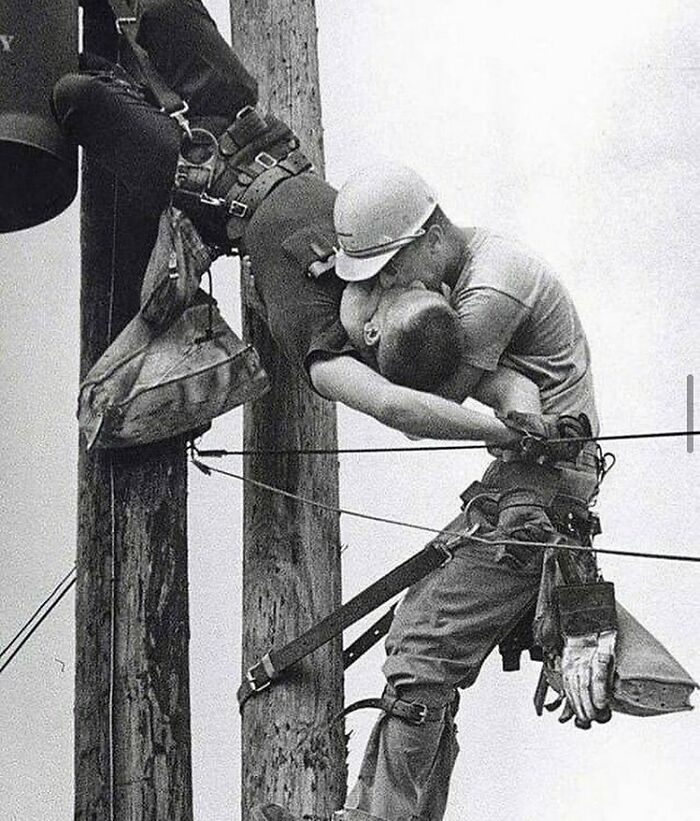
Image credits: historicaleaks
#10 Refusing To Do The Nazi Salute, 1936
The man in this picture is August Landmesser. Landmesser joined the Nazi Party in 1931 and began to work his way up the ranks of what would become the only legal political affiliation in the country. Two years later, Landmesser fell madly in love with Irma Eckler, a Jewish woman, and proposed marriage to her in 1935. After his engagement to a Jewish woman was discovered, Landmesser was expelled from the Nazi Party. Landmesser and Eckler decided to file a marriage application in Hamburg, but the union was denied under the newly enacted Nuremberg Laws. The couple welcomed their first daughter, Ingrid, in October 1935. And then on June 13, 1936, Landmesser gave a crossed-arm stance during Hitler's christening of a new German navy vessel. The act of defiance stands out amid the throng of Nazi salutes. In 1937, fed up, Landmesser attempted to flee Nazi Germany to Denmark with his family. But he was detained at the border and charged with "dishonoring the race," or "racial infamy," under the Nuremberg Laws. A year later, Landmesser was acquitted for a lack of evidence and was instructed to not have a relationship with Eckler. Refusing to abandon his wife, Landmesser ignored Nazi wishes and was arrested again in 1938 and sentenced to nearly three years in a concentration camp. He would never see the woman he loved or his child again. Eckler is believed to have been transferred to what the Nazi's called a "euthanasia center" in 1942, where she was murdered with 14,000 others. After his prison sentence, Landmesser worked a few jobs before he was drafted into war in 1944. A few months later, he was declared missing in action in Croatia.
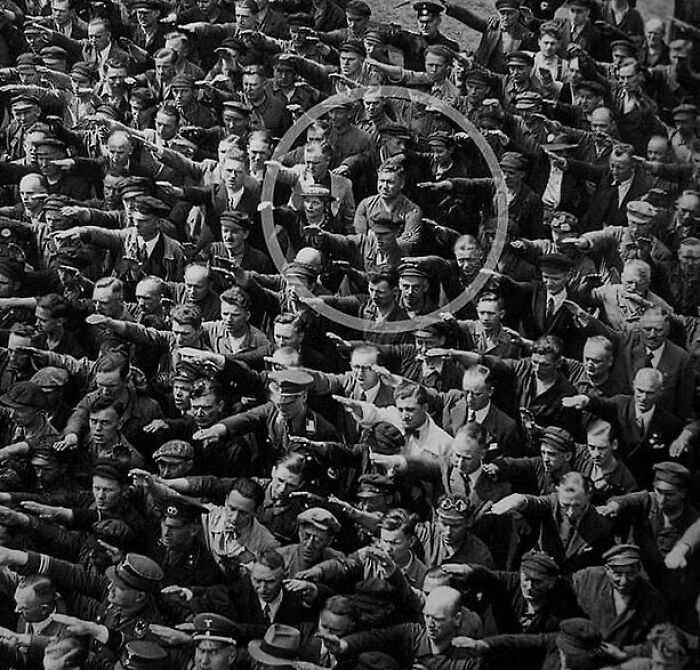
Image credits: historicaleaks
#11 Did You Know About This?

Image credits: historicaleaks
Let’s go back to a time way before the smartphone era. In 1839, an inventor and, surprisingly, a dentist, Alexander S. Wolcott, reached another milestone in photography. He was the first to get a patent for a camera, which was called the Daguerreotype mirror camera. Together with his partner, John Johnson, he was also arguably the first one to open a portrait studio.
#12 Jewish Prisoners After Being Liberated From A Train That Was Taking Them To A Concentration Camp, 1945
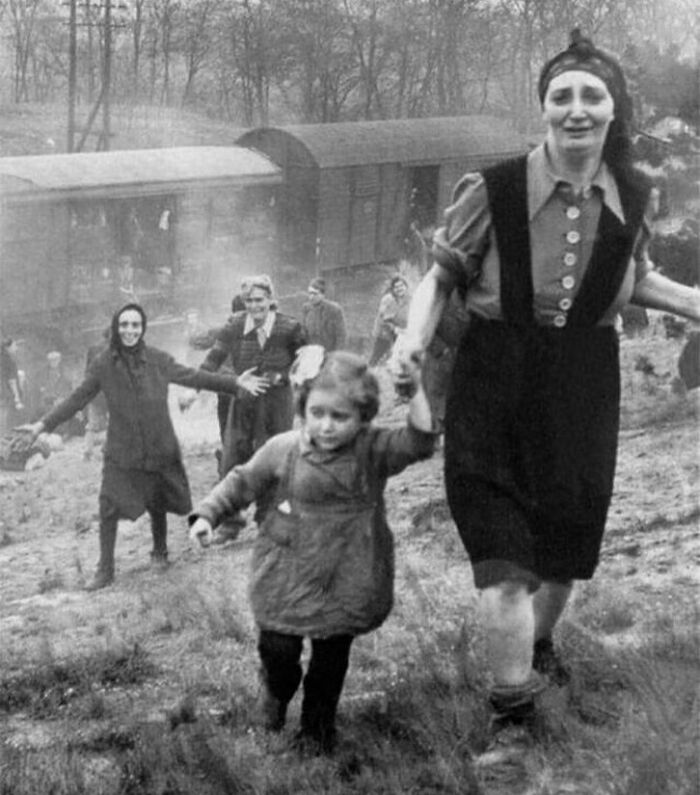
Image credits: historicaleaks
#13 In 1969, When Black Americans Were Still Prevented From Swimming Alongside Whites, Mr.rogers Decided To Invite Officer Clemmons To Join Him And Cool His Feet In A Pool, Breaking A Well-Known Color Barrier
In 1969, when black Americans were still prevented from swimming alongside whites, Mr.Rogers decided to invite Officer Clemmons to join him and cool his feet in a pool, breaking a well-known color barrier
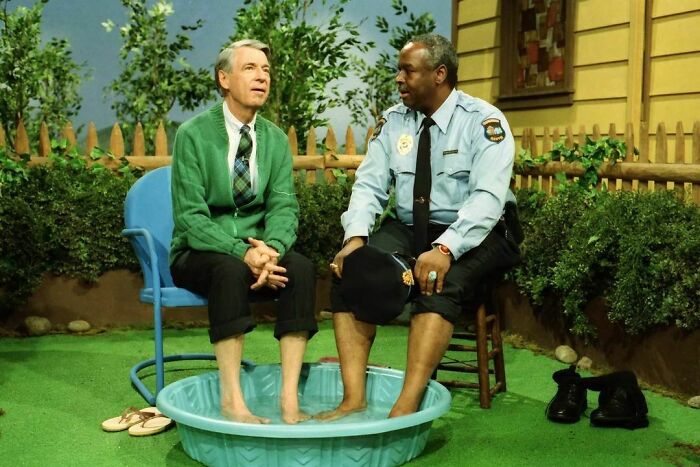
Image credits: historicaleaks
#14 A Member Of The Harlem Hellfighters (369th Infantry Regiment) Poses For The Camera While Holding A Puppy He Saved During World War I, 1918
. The 369th Infantry Regiment, formerly known as the 15th New York National Guard Regiment and commonly referred to as the Harlem Hellfighters, was an infantry regiment of the New York Army National Guard during World War I and World War II. The Harlem Hellfighters were an African-American infantry unit in WWI who spent more time in combat than any other American unit. The regiment was nicknamed the Black Rattlers. The nickname Men of Bronze (French: Hommes de Bronze) was given to the regiment by the French and Hell-fighters (German: Höllenkämpfer) was given to them by the Germans. During WWI, the 369th spent 191 days in frontline trenches. They also suffered the most losses of any American regiment, with 1,500 casualties
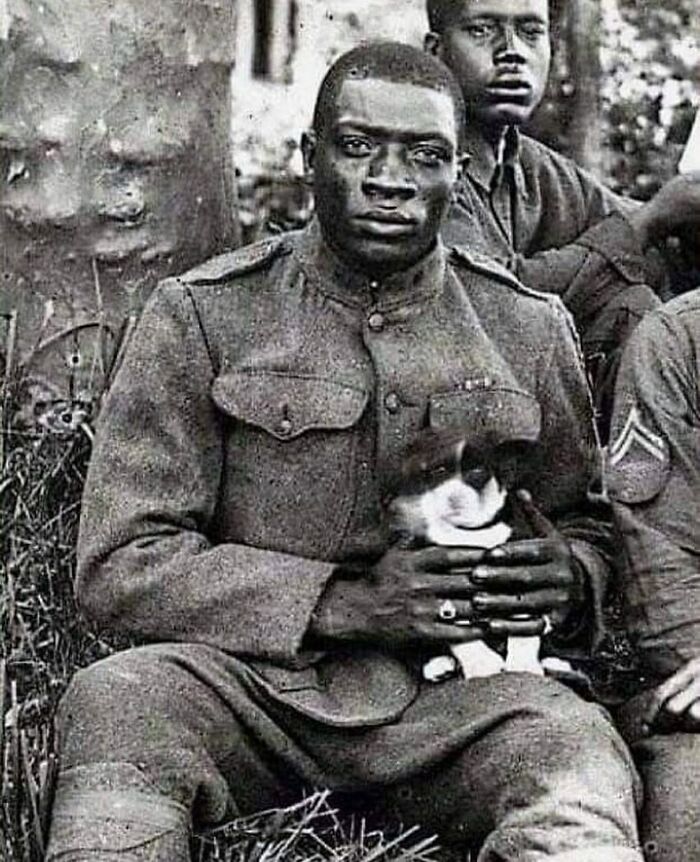
Image credits: historicaleaks
As photography was gaining popularity, people all over the world found ways to develop it. They managed to minimize the time of exposure and capture movement, among other things. That is how they achieved a breakthrough in the history of motion-picture presentations.
Photographer Eadweard Muybridge took pictures of a moving horse by lining a series of cameras along its way. While trotting along, the animal would move a thread attached to each camera and release the shutter. The result was a sequence of pictures of the horse at different points of movement. However, the series received skepticism from some people. Muybridge proved them wrong by using a lantern-slide projector and showcasing the images one after the other.
#15 Japanese Anti-British Propaganda Photos, 1941
The idea behind the picture is that Winston Churchill shares his initials, W.C., with what’s known in the UK as the “Water Closet” or toilet. “During the Second World War, the British and Japanese governments fought a fierce propaganda war in South Asia to influence mass opinion in their favour,” said Parthasarathi Bhaumik, assistant professor of comparative literature at Jadavpur University and a British Library Chevening Fellow. “They exploited all available media—wireless, film, print and live performances… The aim was to discredit the opponent and to project their own side as the true friend of South Asian people.”
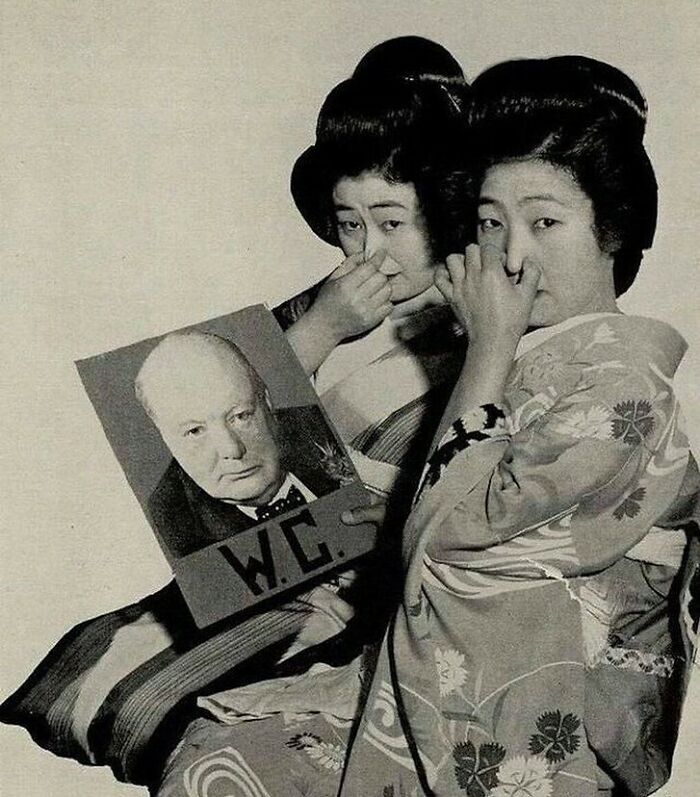
Image credits: historical.leaks
#16 Woman Covering Man's Eyes With Her Knitting At Sight Of Young Woman Taking Off Her Top On The Beach, France, 1974
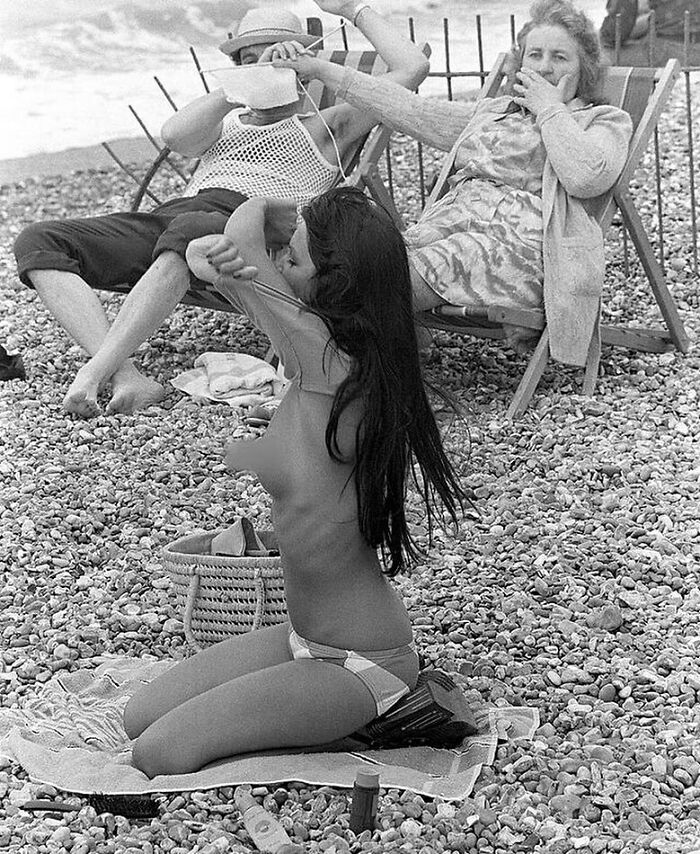
Image credits: historicaleaks
#17 A Woman Dressed Up As Batgirl In 1904, 35 Years Before The Creation Of Batman (1939) And 57 Years Before The Creation Of Batgirl (1961)
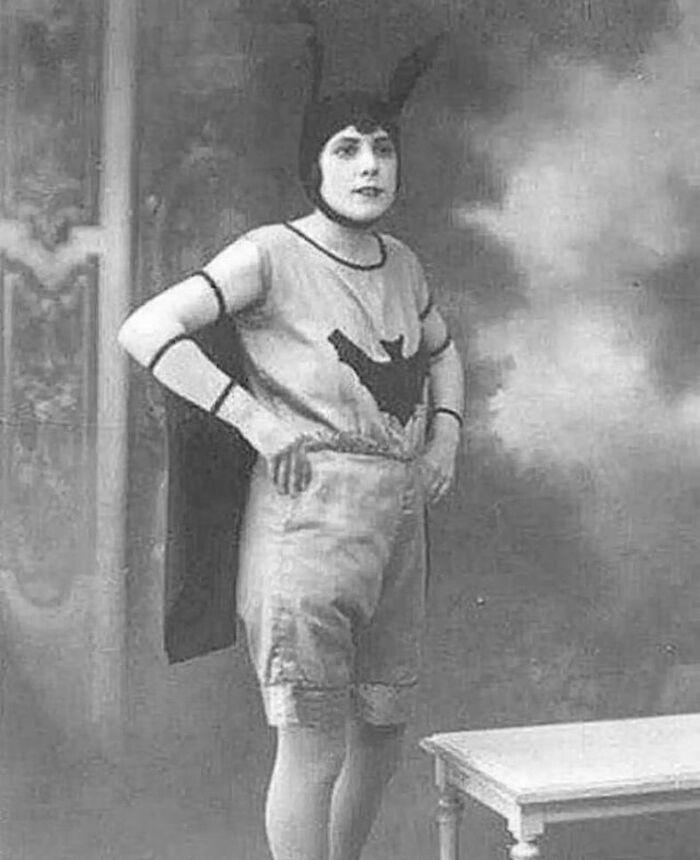
Image credits: historicaleaks
Another turning point in photography was the introduction of colored images. Auguste and Louis Lumière were among the first to start developing ways to do it in the early 20th century. However, the first color camera appeared only in 1935, when Leopold Godowsky, Jr., and Leopold Mannes invented the Kodachrome film.
#18 The Last Photo Taken Of Hachiko On March 8, 1935
Hachiko was a Japanese Akita dog remembered for his unwavering loyalty to his owner. Hachiko, was an Akita dog that belonged to a professor at the University of Tokyo. Every day he would meet his master at Shibuya Station until one day in 1925 when the professor never returned. Unbeknownst to Hachiko, his master had suffered a fatal brain hemorrhage and would never come home again. But there Hachiko sat, day after day, waiting in vain for the return of his master. The story of the dog that never gave up gained a lot of attention from local and national news, inspiring many people to visit Hachiko at Shibuya Station to offer treats. Hachiko was found dead on a street in Shibuya in 1935. His owner’s wife and station staff sit around his body, mourning the loss of the faithful companion. Years later, a statue was erected in Hachiko’s honor and a replica of the original still stands near Shibuya Station
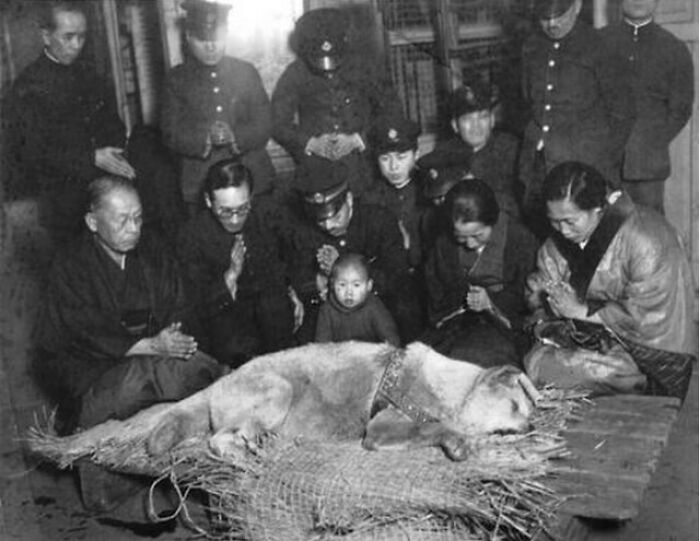
Image credits: historicaleaks
#19 In 1912, Jim Thorpe, A Native American, Had His Running Shoes Stolen On The Morning Of His Olympic Track And Field Event
He found this mismatched pair of shoes in the garbage and ran in them to win two Olympic gold medals that day. Thorpe was the first Native American to win a gold medal for the United States in the Olympics. Considered one of the most versatile athletes of modern sports, he won two Olympic gold medals in the 1912 Summer Olympics (one in classic pentathlon and the other in decathlon). He also played American football (collegiate and professional), professional baseball, and basketball.
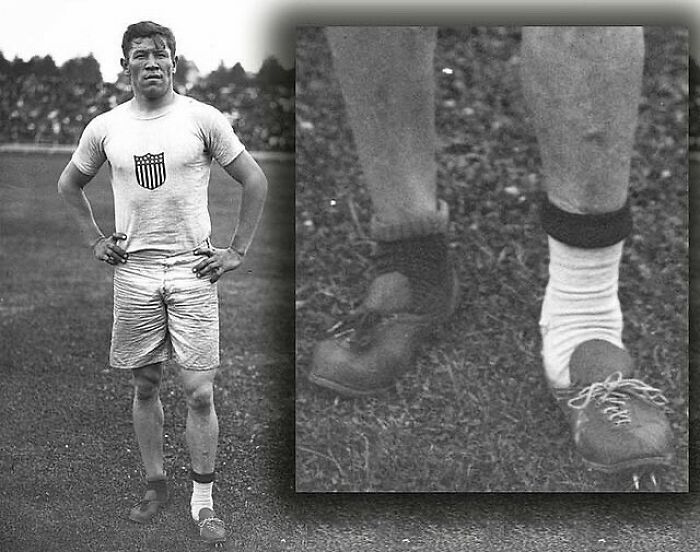
Image credits: historicaleaks
#20 Tereszka, A Girl Who Grew Up In A Concentration Camp Draws A Picture Of "Home" While Living In A Residence For Disturbed Children, 1948
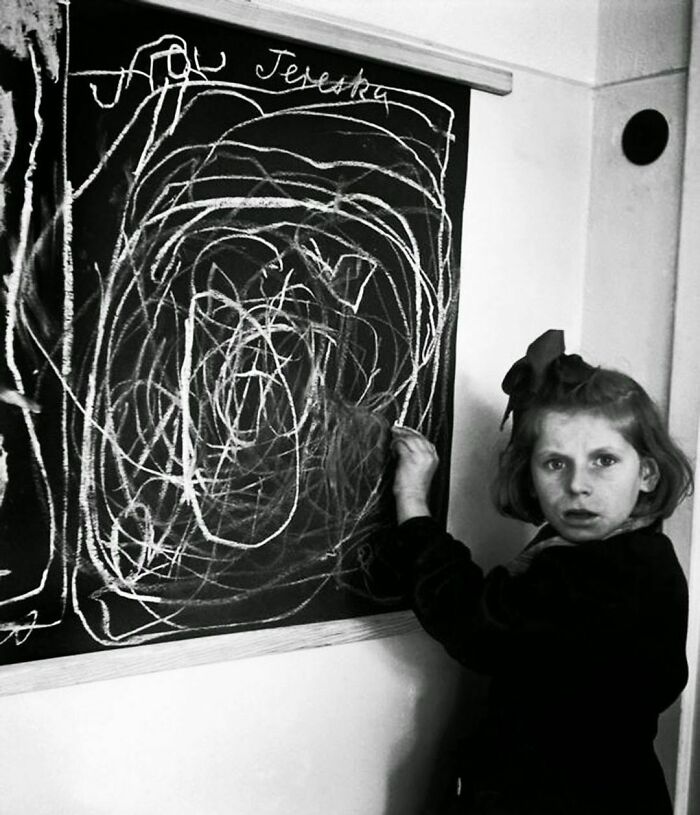
Image credits: historicaleaks
#21 Polish Resistance Veterans Of The Warsaw Uprising (1944), Pictures Then And Now
The Warsaw Uprising (Polish: powstanie warszawskie; German: Warschauer Aufstand) was a major World War II operation, in the summer of 1944, by the Polish underground resistance, led by the Polish resistance Home Army (Polish: Armia Krajowa), to liberate Warsaw from German occupation. The uprising was timed to coincide with the retreat of the German forces from Poland ahead of the Soviet advance. The operation failed. In the end, German troops destroyed the majority of Warsaw during and immediately after the uprising. Among the demolished buildings was the Royal Castle. The Warsaw Uprising failed because of lack of support from the Soviets and British and American unwillingness to demand that Stalin extend assistance to their Polish ally. The Soviet advance in Poland stopped on the Vistula River, within sight of fighting Warsaw. Stalin had broken off diplomatic relations with the Polish government in exile when, in the spring of 1943, it asked the International Red Cross to investigate the killing of thousands of Polish officers at Katyn. The Polish officers were prisoners of the Soviets following its 1939 invasion of Poland in collaboration with Hitler. The Soviets tried to pin the blame on the Germans and did not admit the April 1940 summary executions of at least 21,000 Polish prisoners until some 50 years after the fact.
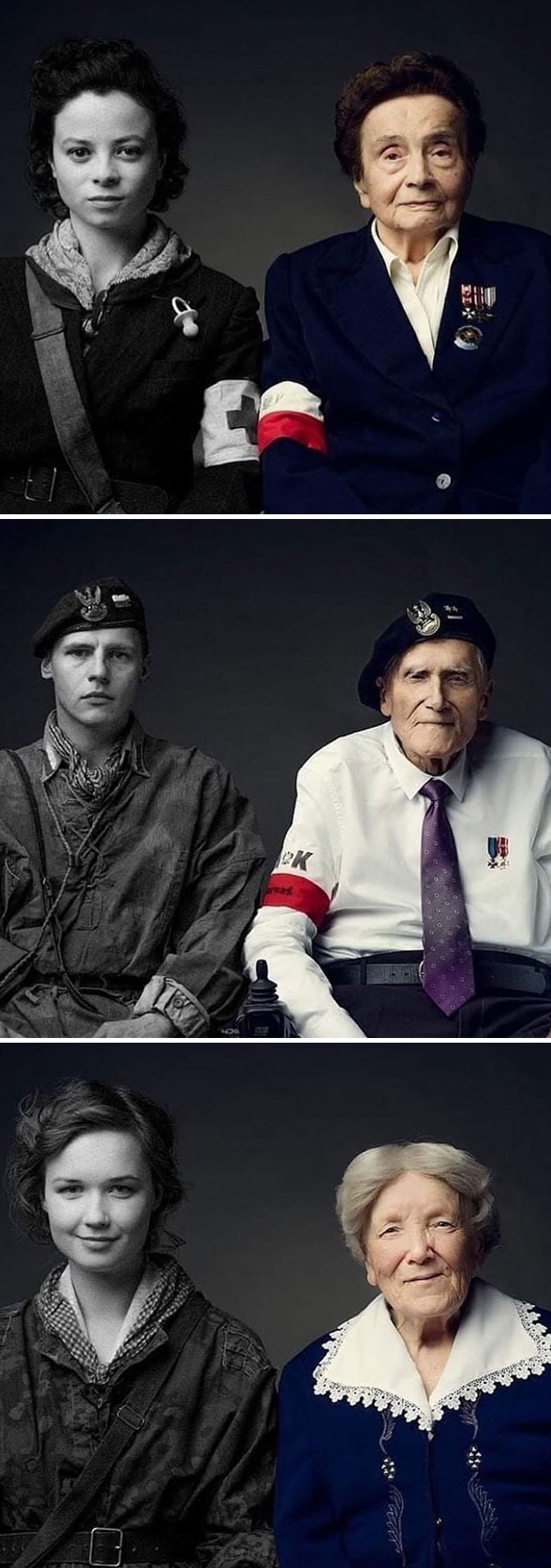
Image credits: historicaleaks
#22 Princeton University Students After A Snowball Fight, 1893. In The Photo Are, From Left, Darwin R. James, John P. Poe, And Arthur L. Wheeler
Before the turn of the 20th century, it was tradition for Princeton students to have snowball fights between the freshman and sophomore classes
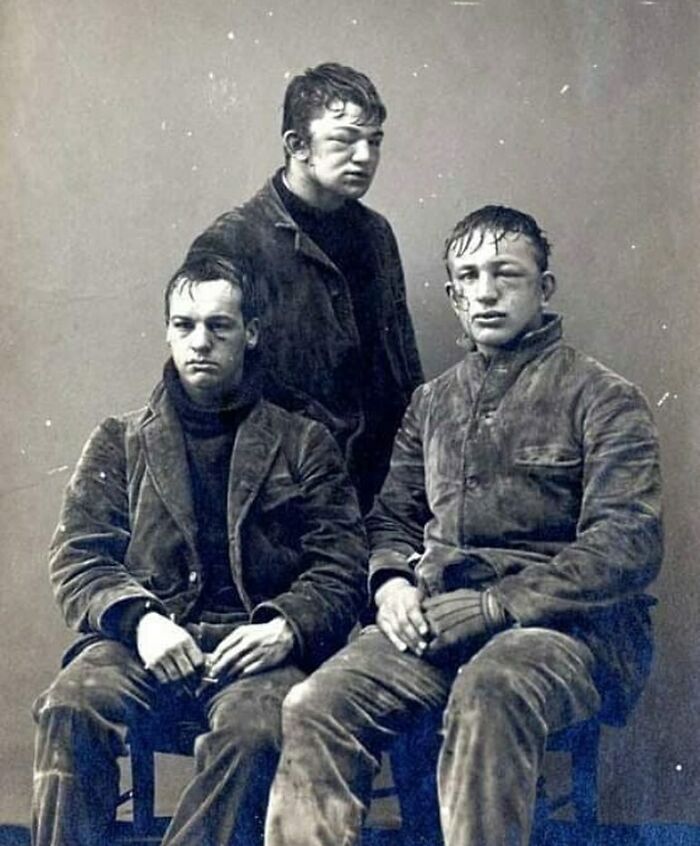
Image credits: historicaleaks
#23 Marine Sergeant Frank Praytor Feeding An Orphaned Kitten. He Adopted The Kitten After The Mother Cat Died During The War, 1952
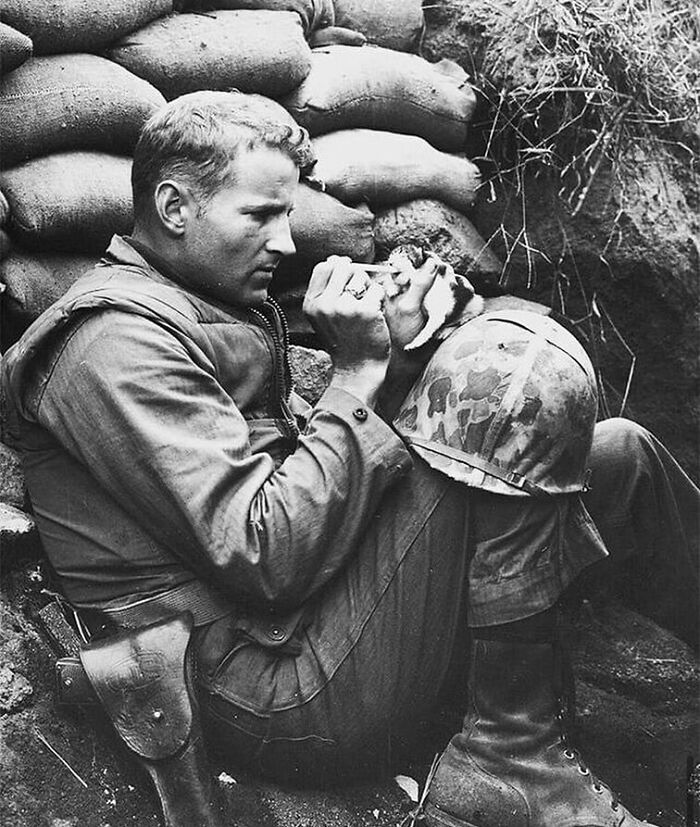
Image credits: historicaleaks
#24 A Young Man Giving Princess Diana Flowers With A Little Help From His Friends, 1989
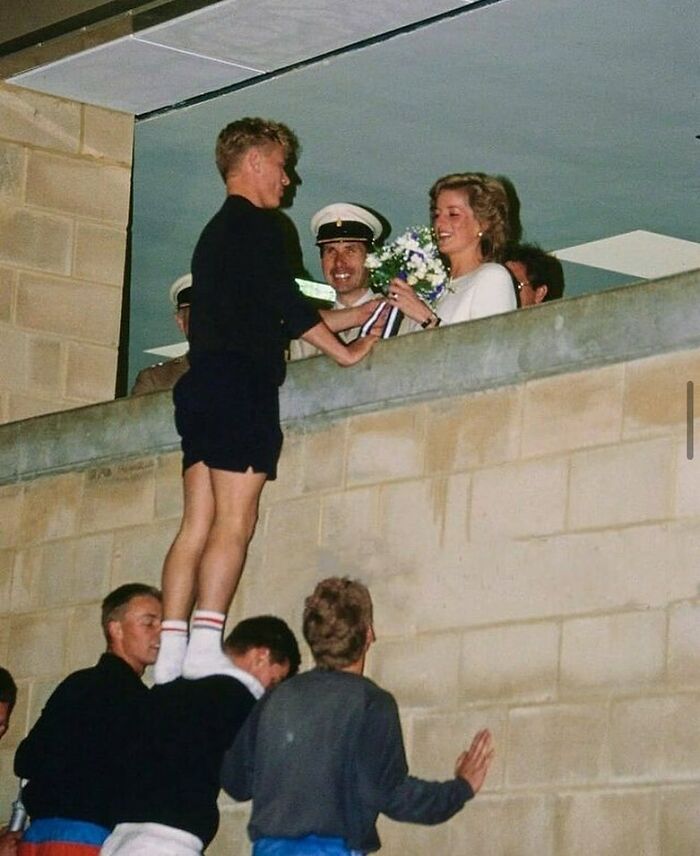
Image credits: historicaleaks
#25 ??
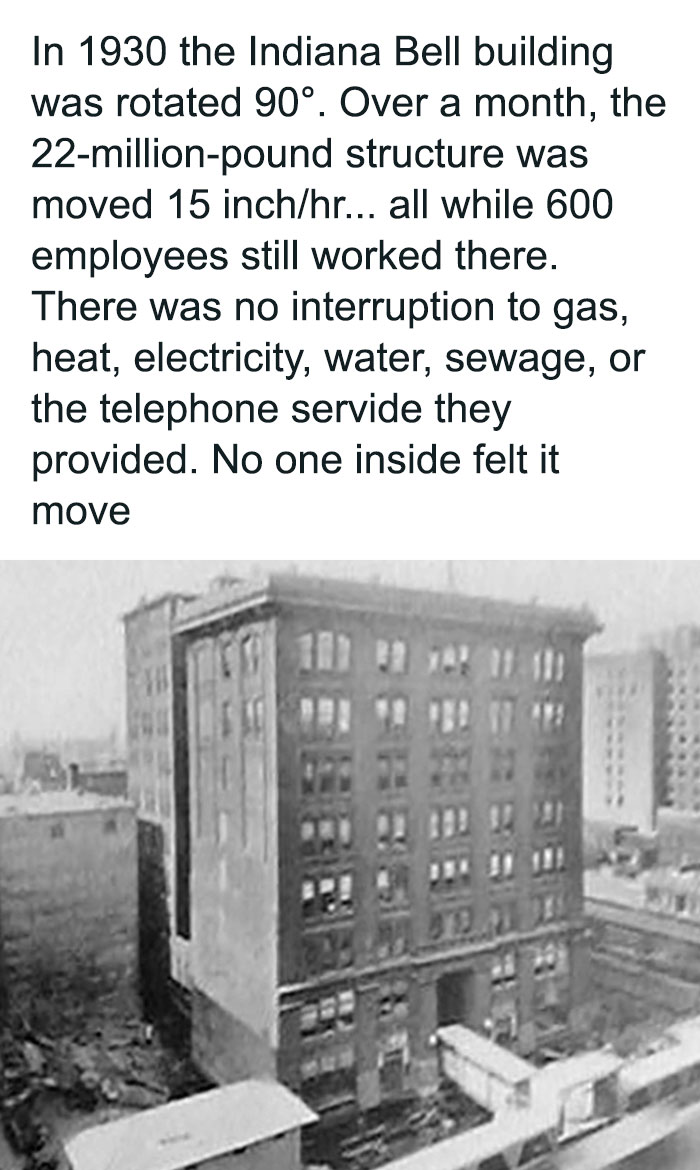
Image credits: historicaleaks
#26 WWII Soldier Sharing A Banana With A Goat During The Battle Of Saipan, 1944
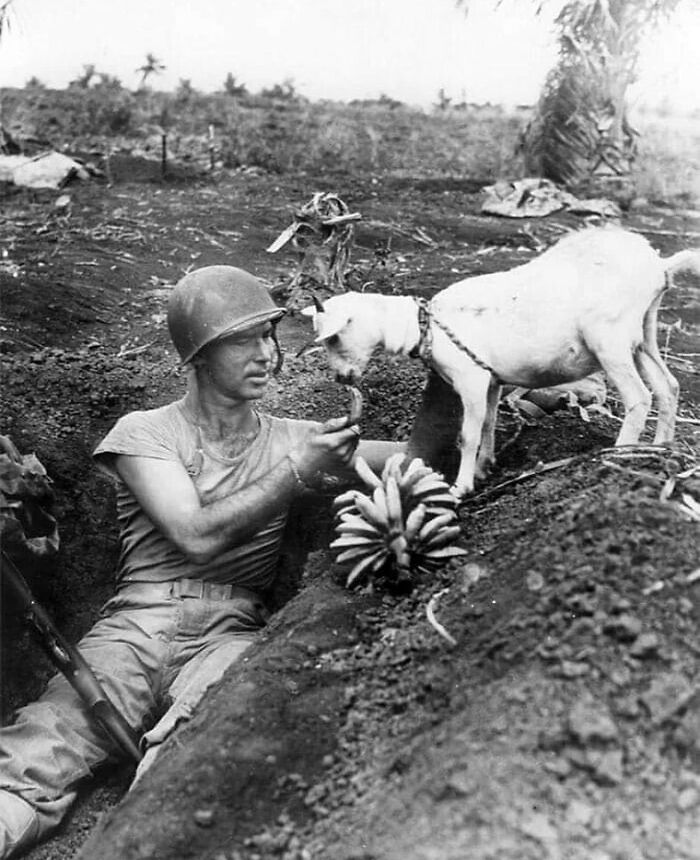
Image credits: historical.leaks
#27 The Mother As A Creator By Annie Wang, She Started A 17-Year Project Before Her Son Was Born, Documenting Her Child Growing Up, Taiwan, 2001

Image credits: historicaleaks
#28 A Man Guards His Family From The Cannibals During The Madras Famine Of 1877 At The Time Of British Raj, India
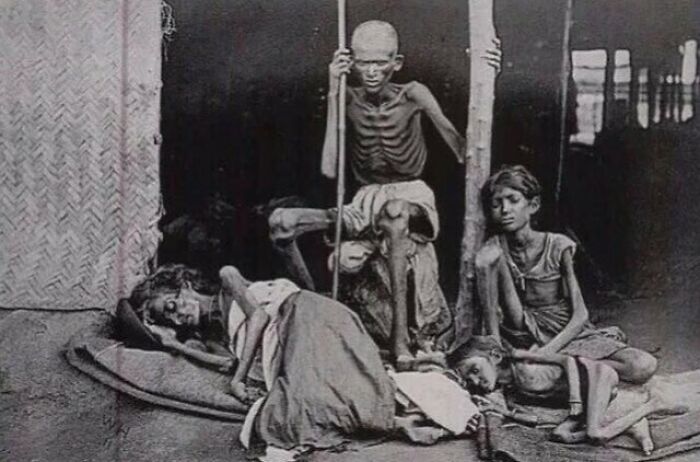
Image credits: historicaleaks
#29 Michelin Men In The 1920s
Michelin was founded in 1888 by the Michelin brothers, André (1853–1931) and Édouard (1859–1940), the company manufactured tires for bicycles and horse-drawn carriages before introducing pneumatic tires for automobiles in the 1890s. In 1926, Michelin began reviewing restaurants so that more people would travel further distances in their cars to eat at these restaurants. This in turn would wear down their tires faster, and force them to buy more. The star system that Michelin uses goes up to three and is broken down by whether or not it's worth driving to the restaurant. One star: "A very good restaurant in its category" (Une très bonne table dans sa catégorie). Two star: "Excellent cooking, worth a detour" (Table excellente, mérite un détour). Three star: "Exceptional cuisine, worth a special journey" (Une des meilleures tables, vaut le voyage).
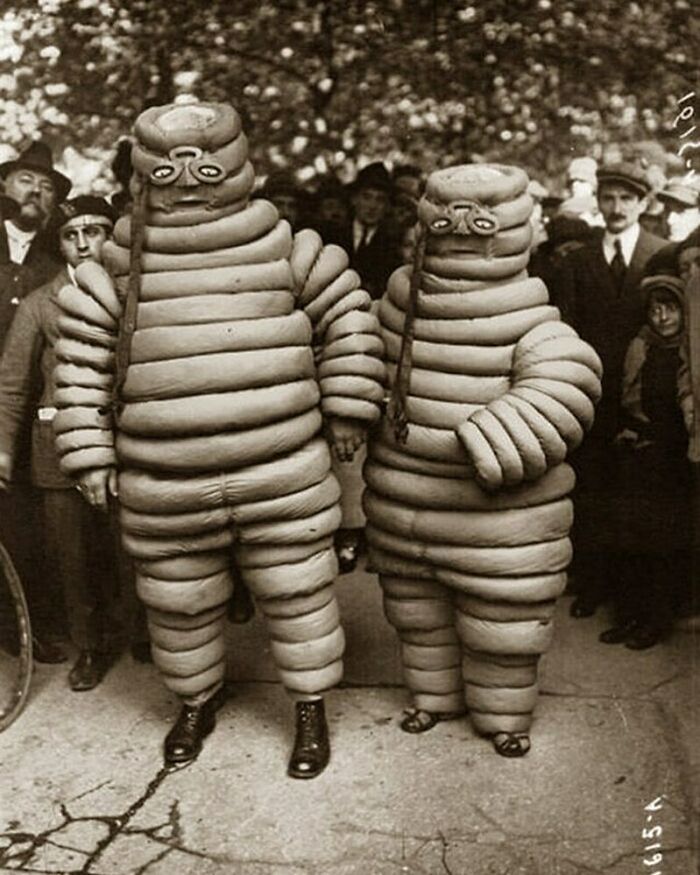
Image credits: historicaleaks
#30 A Woman Smiling And Goofing Around While Taking Photos, Late 1800s
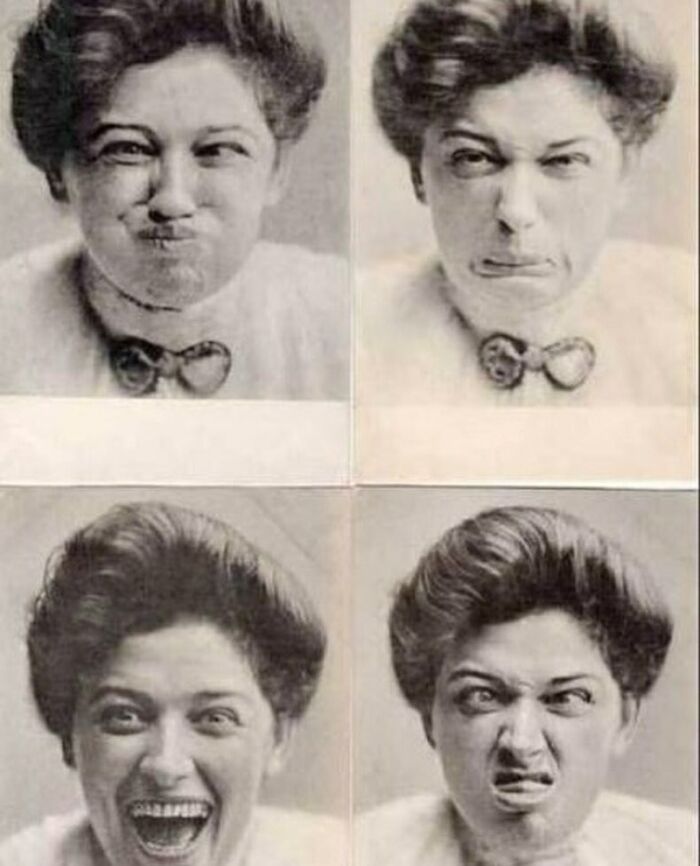
Image credits: historicaleaks
#31 Granny Winning First Prize For Her Marijuana Plant At The California City County Fair, 1973
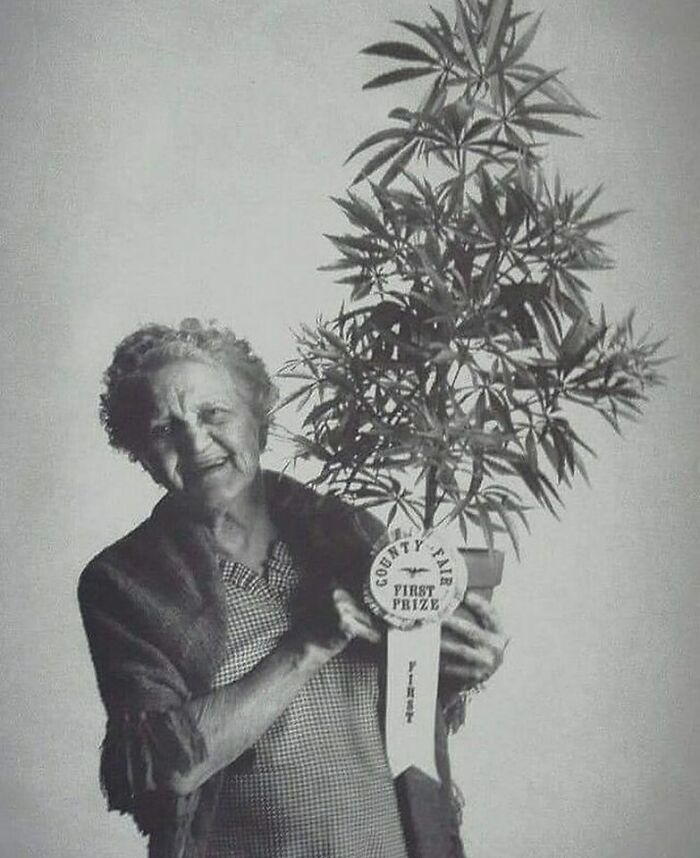
Image credits: historicaleaks
#32 Chinese Doctor Says Goodbye To His Wife Before Going To Wuhan To Help Treat Covid-19 Patients, China, 2020
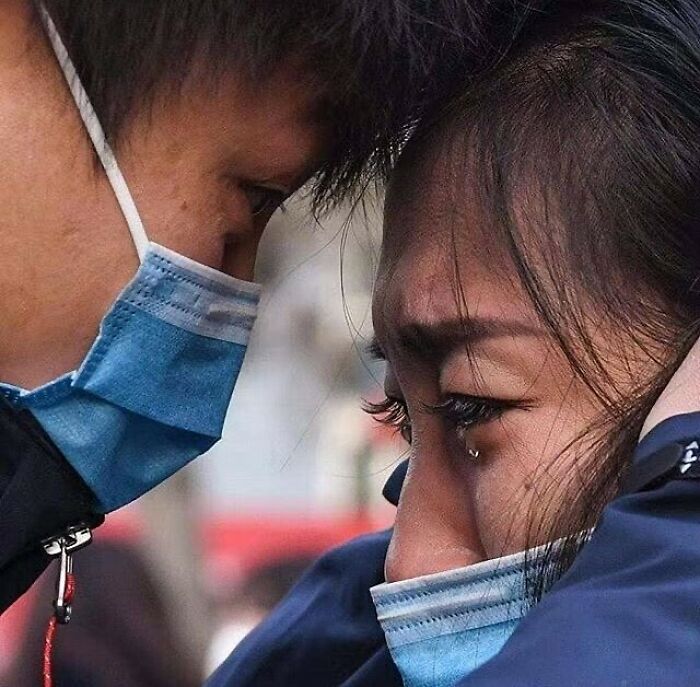
Image credits: historicaleaks
#33 “When I Told My Father I Was Going To Marry Jake He Said, ‘If You Marry That Man You Will Never Set Foot In This House Again.’
He was horrified that I could contemplate marrying a black man, and I soon learned that most people felt the same way. The first years of our marriage living in Birmingham were hell — I cried every day, and barely ate. No one would speak to us, we couldn’t find anywhere to live because no one would rent to a black man, and we had no money. People would point at us in the street. Then I gave birth to a stillborn son at eight months. It wasn’t related to the stress I was under but it broke my heart, and we never had any more children. Now it’s very hard to comprehend the prejudice we encountered, but you have to remember that there were hardly any black people in Britain in the Forties. I met Jake when he came over during the war from Trinidad, as part of the American forces stationed at the Burtonwood base near my home in Lancashire. We didn’t even know they spoke English, but Jake and I got chatting. He quoted Shakespeare to me, which I loved. Jake returned to Trinidad, but we carried on writing to each other, and a few years later he returned to the UK to get better paid work. 'No family came to our register office wedding in 1948... I do not regret marrying him for an instant, despite all the pain we have suffered' He asked me to marry him, quite out of the blue, when I was only 19. My father threw me out, and I left with only one small suitcase to my name. No family came to our register office wedding in 1948. But gradually life became easier. I got teaching jobs, ending up as a deputy head teacher. First Jake worked in a factory, then for the Post Office. Slowly we made friends together, but it was so hard. My father died when I was 30 and although we were reconciled by then, he never did approve of Jake. Today we have been married for 63 years, and are still very much in love. I do not regret marrying him for an instant, despite all the pain we have suffered.”
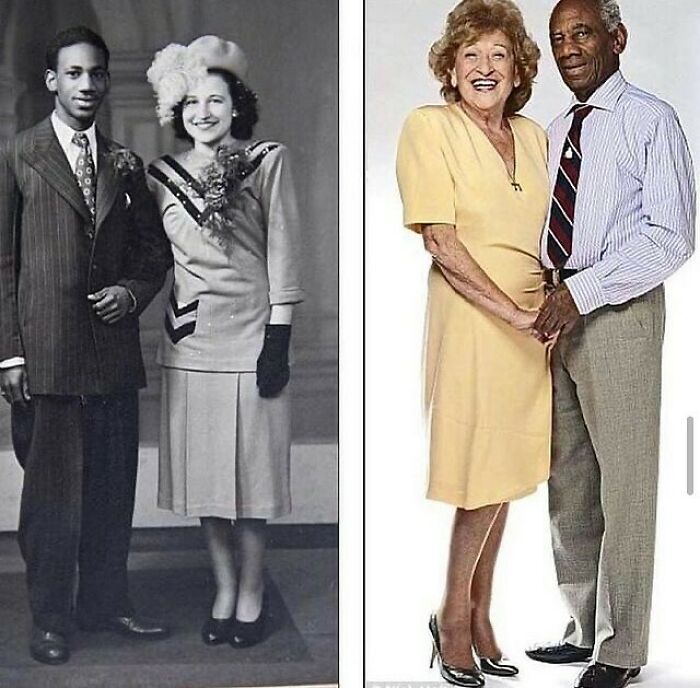
Image credits: historicaleaks
#34 During WWII, Jews In Budapest Were Brought To The Edge Of The Danube, Ordered To Remove Their Shoes, And Shot, Falling Into The Water Below. 60 Pairs Of Iron Shoes Now Line The River's Bank, A Ghostly Memorial To The Victims
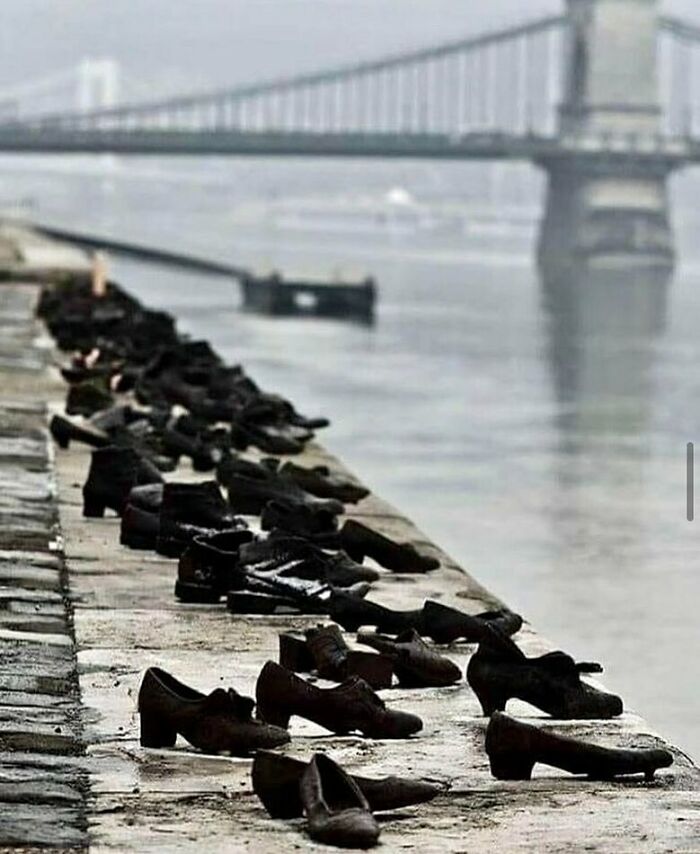
Image credits: historicaleaks
#35 Pictured Above Is Astronaut Leland D. Melvin's Official Nasa Portrait
When NASA astronaut Leland Melvin was assigned to a space shuttle mission in 2008, he was told he could bring his family for the official photo shoot wearing the famous orange “pumpkin suit.” They didn’t say two-legged or four-legged, and although dogs are not allowed on base at NASA, family is family. So, Melvin brought his rescue dogs Jake and Scout along with a neighbor to hold them and keep them quiet in the back of his van. “I got to the guard shack, flashed my badge, and I gunned the van and drove to the photo lab,” Melvin said. He then went up the back stairs where the photographer was waiting, went into the photo lab with 100 MilkBones to keep the dogs busy while he changed into the suit and came out. “They (the dogs) ran toward me, and I told the photographer to hold his finger on the shutter and that’s how the photo was born.” After the photo shoot, Melvin had to change and the MilkBones were gone. “The dogs started barking and a security guard came in and asked if there were dogs in there,” Melvin said. “We said, ‘No, that’s the doggy screensaver.’ ” After he changed he was able to quiet the dogs and get out of there

Image credits: historicaleaks
#36 Parisian Woman With Her Cat In Her Cannabis Garden, 1910s
Original caption: “This lovely young Parisian woman is enjoying a serene moment in her lush garden in the 1910s in France. Her companions are her fluffy faithful feline and her caged bird. Keeping songbirds as pets is a hobby as old as the ancient Sumerians, but small home aviaries became a status symbol in the 1800s and early 1900s. Likely, this young lady enjoyed the company of her birds as a way to connect with nature. Interestingly, her garden contains several cannabis plants. It could be that the unique leaves and vibrant foliage was sought after as a garden plant. Or it could be that the young woman or her family were utilizing the medicinal properties of the cannabis plant to treat any one of a number of ailments.”
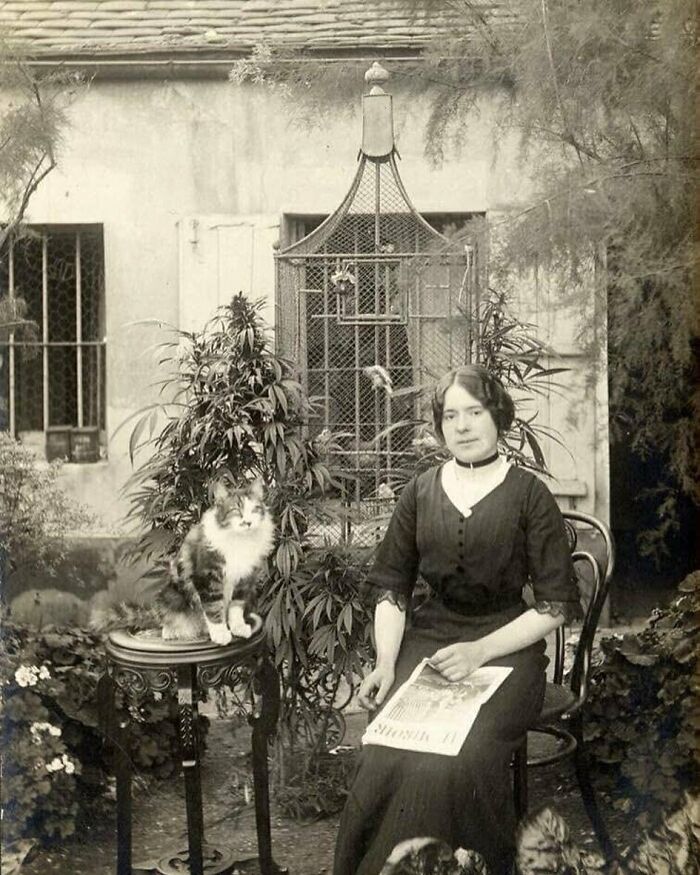
Image credits: historicaleaks
#37 A Young Man Demonstrating Against Low Pay For Teachers, C. 1930s
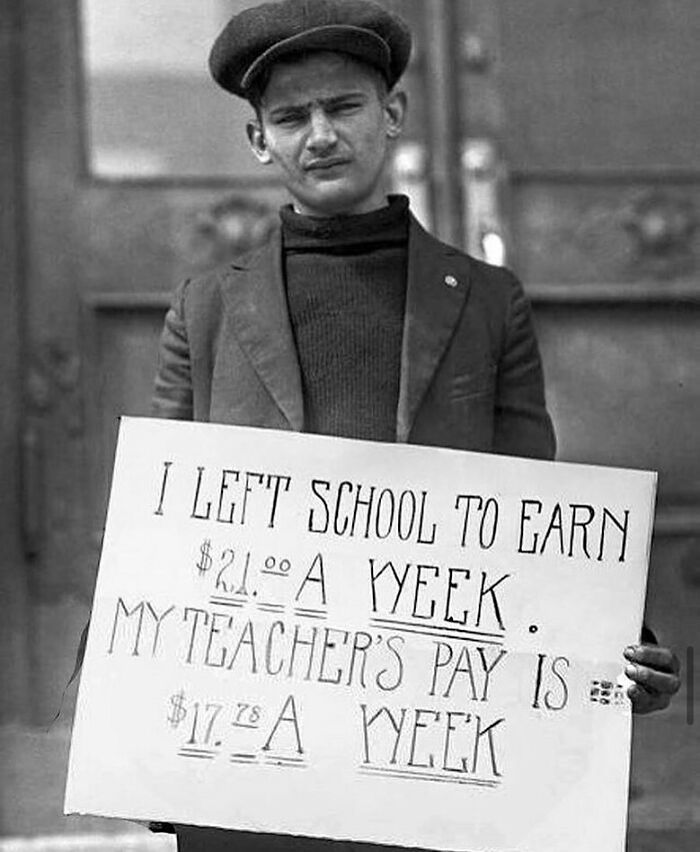
Image credits: historicaleaks
#38 Studio Photos Of Two Women, 1900s
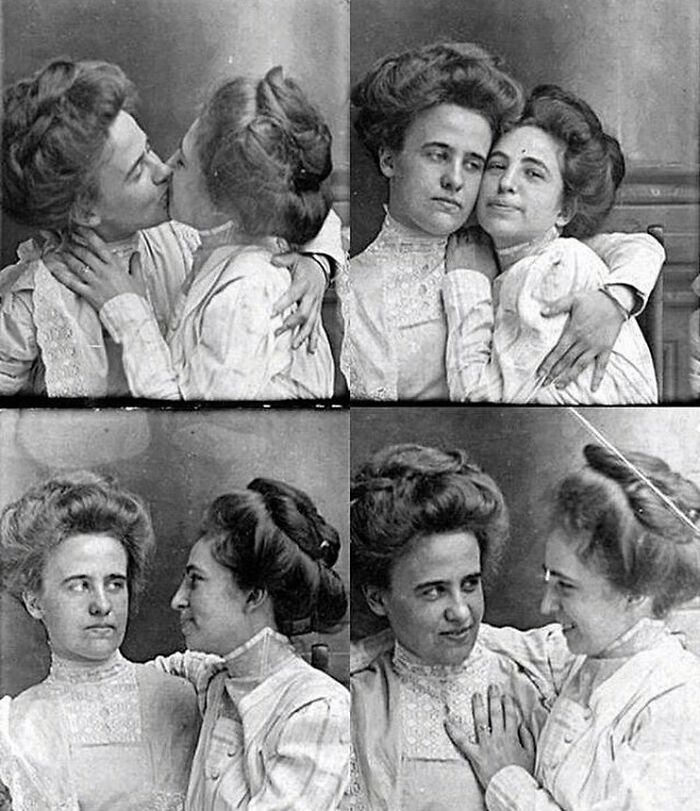
Image credits: historicaleaks
#39 Soldiers Paying Tribute To 8 Million Horses, Donkeys And Mules That Died During World War I, 1915
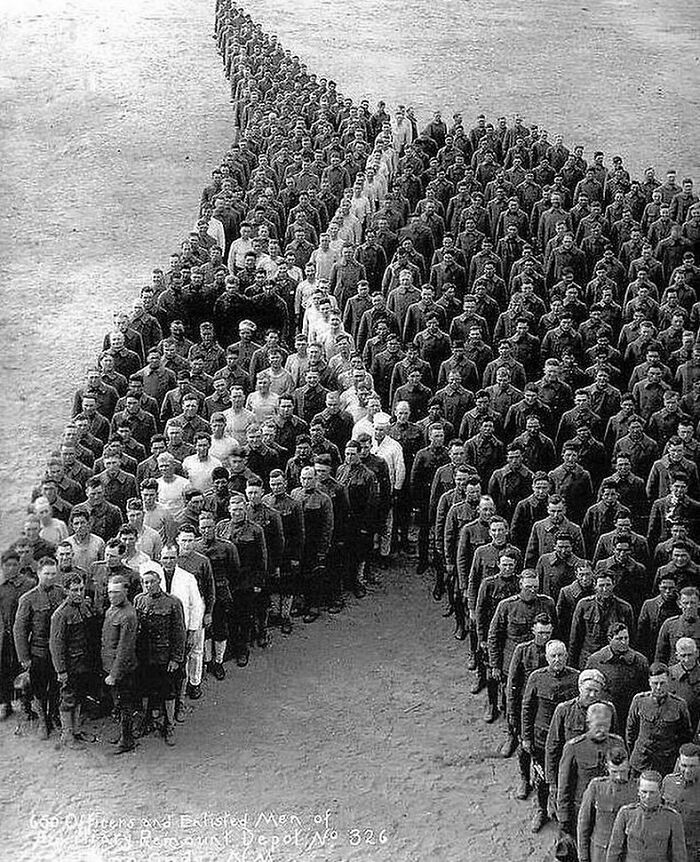
Image credits: historicaleaks
#40 Korean War Goodbye Kiss, Los Angeles, 1950
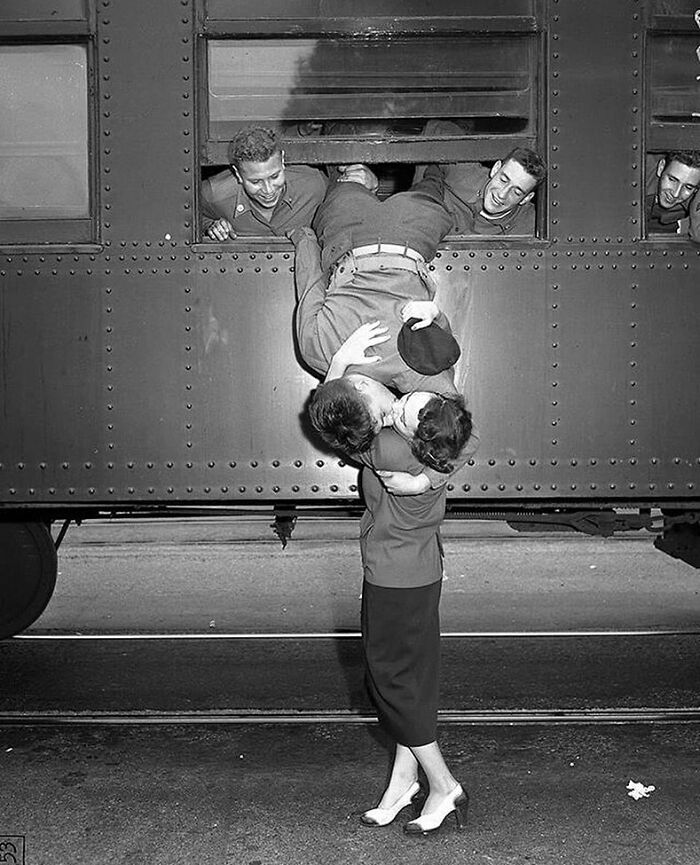
Image credits: historicaleaks
#41 Ella Harper (1870-1921), Also Known As The Camel Girl
Ella Harper was born with a very rare condition that caused her knees to bend backwards, called congenital genu recurvatum. Her preference to walk on all fours resulted in her nickname Camel Girl. In 1886 she featured as the star in W. H. Harris’s Nick Patel circus, appearing in newspapers wherever the circus visited. Ella Harper received a 200$ salary per week during her career in the circus
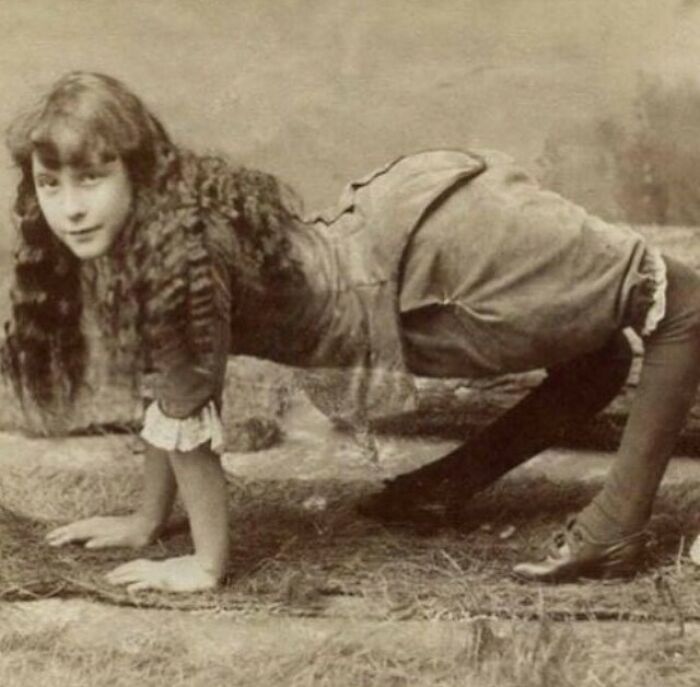
Image credits: historicaleaks
#42 From 1785 To 1922, White Wolf, As Known As Chief John Smith Said To Have Lived 137 Years
White Wolf Chief John Smith was a Native American of the Ojibwe (also known as Ojibwa, Chippewa, or Saulteux) people that lived in the Cass Lake, Minnesota area of the United States during the 1800s and early 1900s. He is best known for his extremely wrinkled appearance, and that people claimed that he is the oldest Native American to ever live. It is often claimed that he was 138 years old at the time of his death on February 6th, 1922. Chief John Smith was not only known as “White Wolf” but he also had many other nicknames, often related to the way his skin looked, or the fact he was old. He was known as Gaa-binagwiiyaas (translates to “which the flesh peels off”), Kahbe nagwi wens, Ga-Be-Nah-Gewn-Wonce (which roughly means “wrinkled meat”), Grandpa John, and The Old Indian. John Smith had all of these nicknames because he was a relatively well-known face not only in Minnesota but also across the entire country. He was often used as the face of the Chippewa people in the area, being photographed by photographers that would sell the photos as postcards and similar things like that. Chief John Smith himself would carry around photos to sell to “fans”. As well as this, in 1920, White Wolf Chief John Smith featured in a movie that featured old Native Americans called “Recollections of Ga-be-nah-gewn-wonce”. It toured the country so it made him well-known across all of the United States
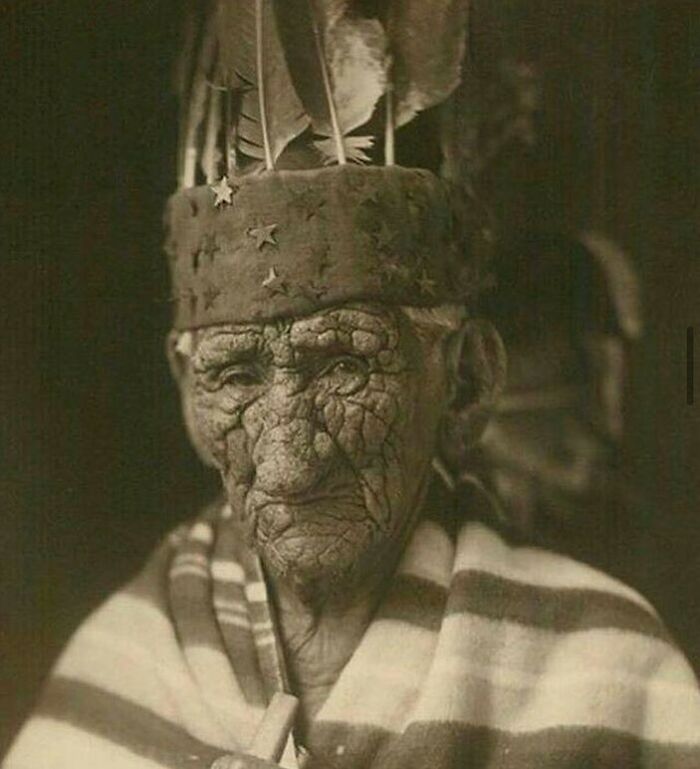
Image credits: historicaleaks
#43 The Pinocchio Incident, 1940

Image credits: historicaleaks
#44 Pictured Is A Young Boy In The Gardens Of Bomarzo, 1952
The Sacro Bosco ("Sacred Grove"), also called Park of the Monsters (Parco dei Mostri in Italian), also named Garden of Bomarzo, is a Mannerist monumental complex located in Bomarzo, in the province of Viterbo, in northern Lazio, Italy. The park was created in the 16th century. The monster in the photograph is the Orcus Mouth. It is the God of the underworld, and “punisher of broken oaths” in Italic and Roman mythology.
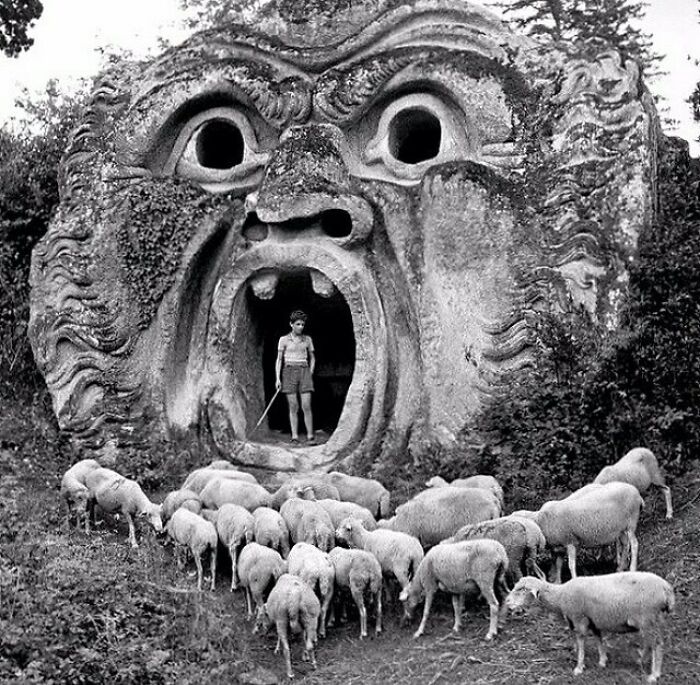
Image credits: historicaleaks
#45 Best Friends Since Ww2
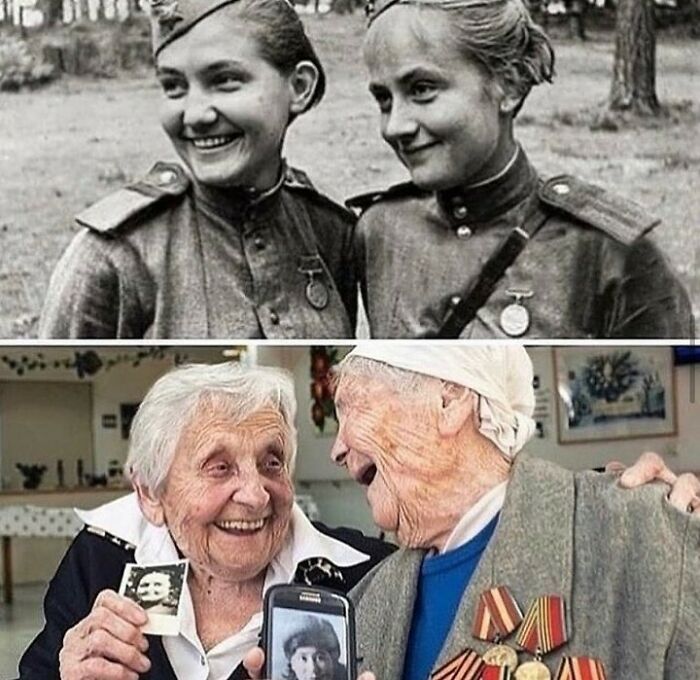
Image credits: historicaleaks
#46 During World War II, Gilbert Bradley Was In Love And Wrote Many Letters With His Loved One Who Signed His Letters With The Initial “G”
70 years later, it became known that the G it was a diminutive for Gordon. In that time homosexuality was illegal and they had to hide their relationship. In one of his letters he said: “Wouldn’t it be wonderful if all our letters could be published in the future in a more enlightened time. Then all the world could see how in love we are.”
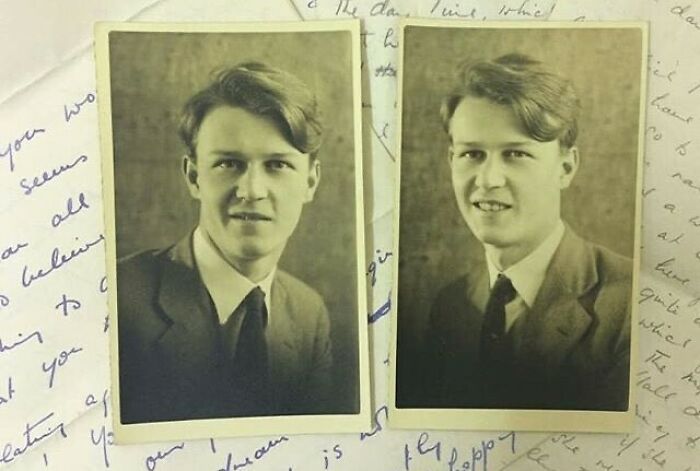
Image credits: historicaleaks
#47 High School Yearbook Photo, 1996
"When I was in band camp at App State in 94, I saw this skater kid who played french horn. He had a similar hairdo (and pulled it off way better than I did). He had straight hair, and I'm blessed with a curly madness. I tried to emulate it, to no avail. But what you see before you is what I had. Dad wasn't stoked, mom let me be me, and I was Grandmother's favorite."

Image credits: historicaleaks
#48 Brian May Standing Where His Band 'Queen' Once Stood
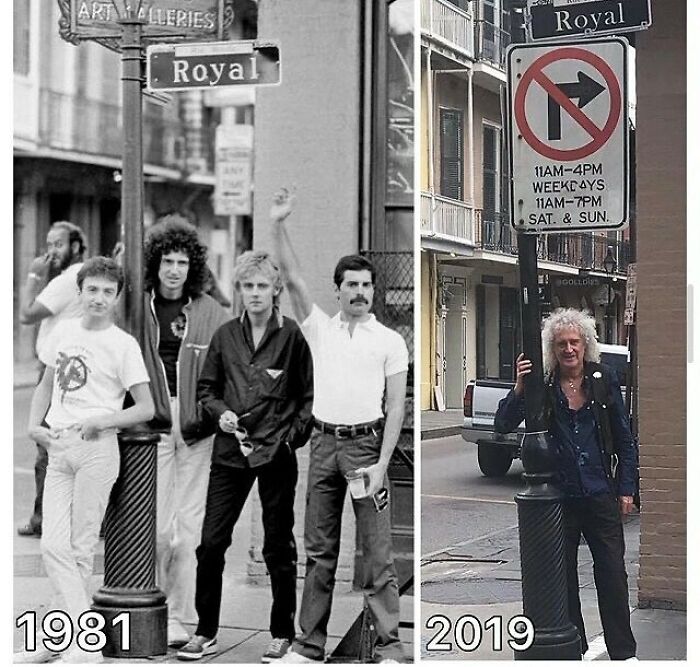
Image credits: historicaleaks
#49 Dutch Men In Traditional Trousers, 1900
Weather conditions determine appropriate clothing in the Netherlands. Otherwise, clothes appear similar to those worn elsewhere. Netherlands culture has unique traditional clothes, although people in the Netherlands only wear traditional clothes during special occasions. The traditional male costume includes woolen pants with silver buttons on the front square flap, as well as wooden clogs, a shirt, a jacket and a hat. The shape and design of the hat varies according to region
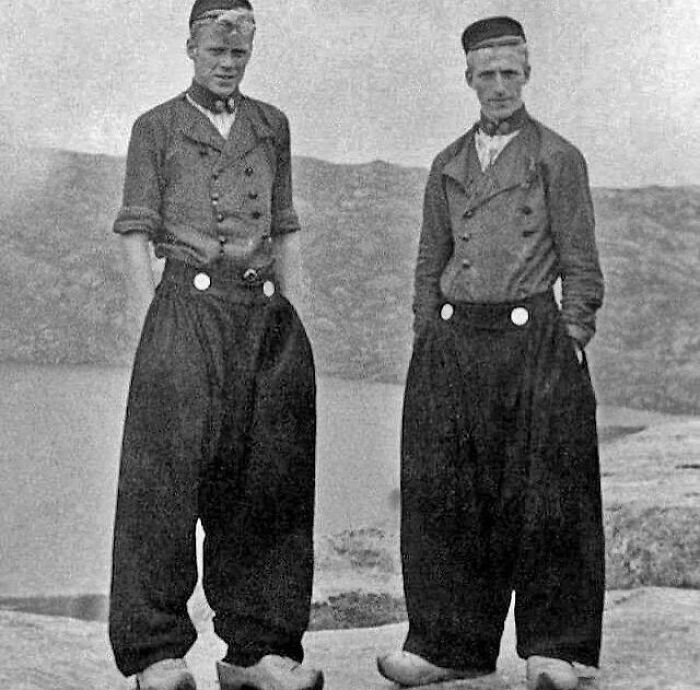
Image credits: historicaleaks
#50 In 1828, An American Artist Named Sarah Goodridge Painted A Portrait Of Her Own Breasts And Sent It To Lawyer And Politician Daniel Webster, Who Had Become A Recent Widower
It is considered one of the earliest cases of someone sending nudes. The portrait was in a miniature format and inside a leather case enclosed with two clasps, which suggests it was for his eyes only. It measured only 2.6 by 3.1 in (6.7-by-8-centimeter). Goodridge was 40-years-old when she completed the watercolor on ivory. Goodridge never married. When Webster died, the painting was discovered along with his other personal belongings. It was eventually auctioned off for $15,000
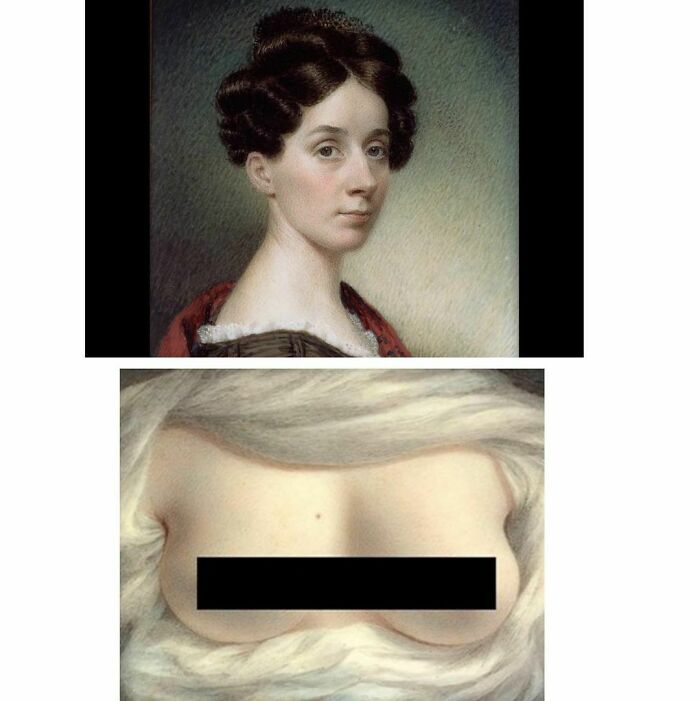
Image credits: historicaleaks
#51 A Soldier's Face Before And After The War: 1941 vs. 1945
The man in the photo is Evgeny Stepanovich Kobytev. In 1941 he was a young man ready to start his creative life as an artist when Germany attacked the Soviet Union and he had to join the Army. However, all his dreams were cut short on June 22, 1941 when Nazi Germany attacked Soviet Union. The new artist voluntarily became a soldier and enlisted in one of the artillery regiments of the Red Army. The regiment was engaged in a fierce battle to protect the small town of Pripyat, which lies between Kiev and Kharkiv. In September 1941, Kobytev was wounded in the leg and became a prisoner of war. He ended up in a German notorious concentration camp operated out of Khorol, which was called “Khorol pit” (Dulag #160). Approximately 90 thousand prisoners of war and civilians died in this camp. In 1943, Kobytev managed to escape from captivity and again rejoined the Red Army. He participated in various military operations throughout Ukraine, Moldova, Poland, Germany. After the Second World War ended, he was awarded the Hero of the Soviet Union medal for his excellent military service during the battles for liberation of Smila and Korsun in Ukraine. However, the High Command refused to award him the Victory over Germany medal since his military career was “spoiled” for being a prisoner of war
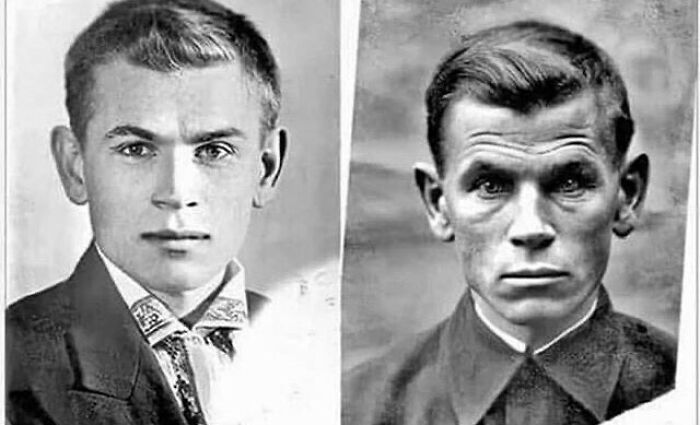
Image credits: historicaleaks
#52 Pictured Above Is Gunnar Kaasen. He And His Team Of 13 Dogs, LED By The Siberian Husky, Balto, Completed The Last Leg Of A 1925 Trip To Deliver 300,000 Units Of Diphtheria Antitoxin To Nome, Alaska
They traveled by night in temperatures of -23° F (-31° C). Kaasen came to the United States to mine for gold in 1903, and settled in Nome, where he became an experienced musher. When diphtheria hit the town and the lone doctor's supply of serum was found to be expired, Kaasen was one of twenty mushers who worked to transport 300,000 units of serum to Nome from Nenana, Alaska. The mushers and the combined teams of over one hundred dogs experienced subzero temperatures, severe winds and whiteout conditions. A number of dogs froze to death during their leg of the journey. After the serum run, Kaasen and his lead dog, Balto, were dogged by publicity, glorified as though they had made the entire journey themselves, even though there were nineteen other mushers who were part of the chain, one of whom made a longer run than Kaasen and his team. He and Balto even starred briefly in a movie about Balto. He was accused of being a publicity hog, but he had his defenders as well. Kaasen and his wife Anna moved to Everett, WA, in 1952, where he died of cancer at the age of 78
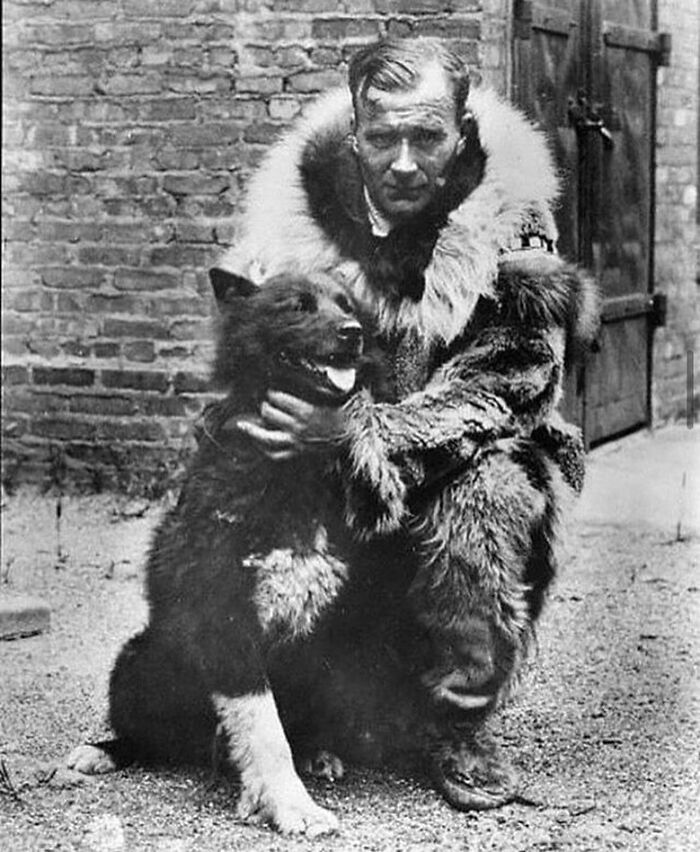
Image credits: historicaleaks
#53 Pictured Above Is A Rwandan Man With Amasunzu Hairstyle, 1923
Amasunzu is a traditionally Rwandan hairstyle that was once worn by men, as well as by unmarried women in order to indicate to potential suitors that they were single and of marriageable age. Rwandans used to wear the amasunzu style in more than 30 different ways. A man was identified as powerful, noble and brave if they had the hairstyle. It also showed prestige, especially among men. According to theatre and film artiste John Kennedy Mazimpaka, 54, there were even competitions on who had the best amasunzu design. “The young were always very anxious to be old enough to sport the style,” he said. Although the amasunzu has fallen out of style in recent decades, it is currently experiencing a revival in popular interest
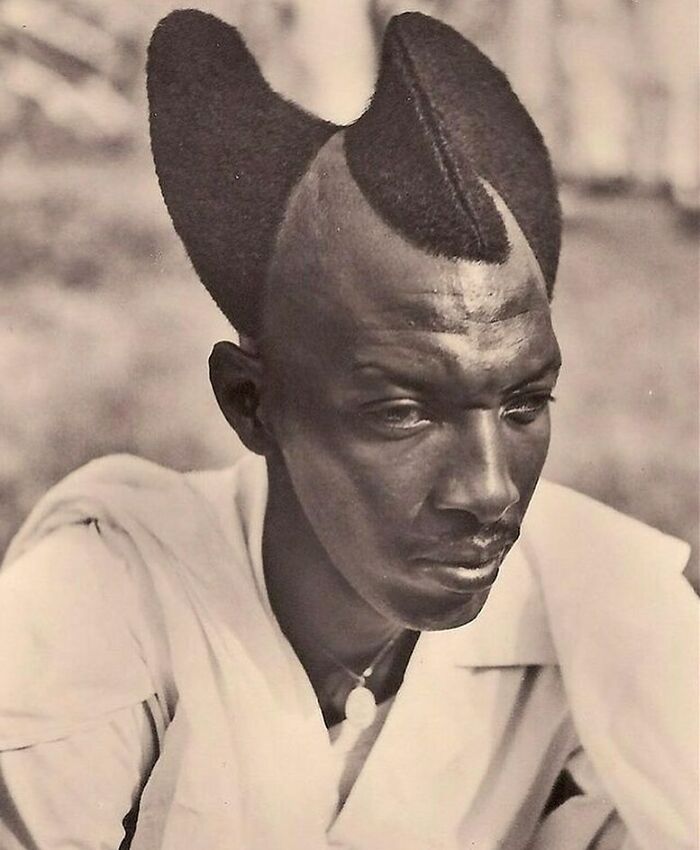
Image credits: historicaleaks
#54 Leonardo Dicaprio With His Parents In The 1970s And 1990s

Image credits: historicaleaks
#55 Drunk Ernest Hemingway Playing Soccer With A Can Of Beer, 1959
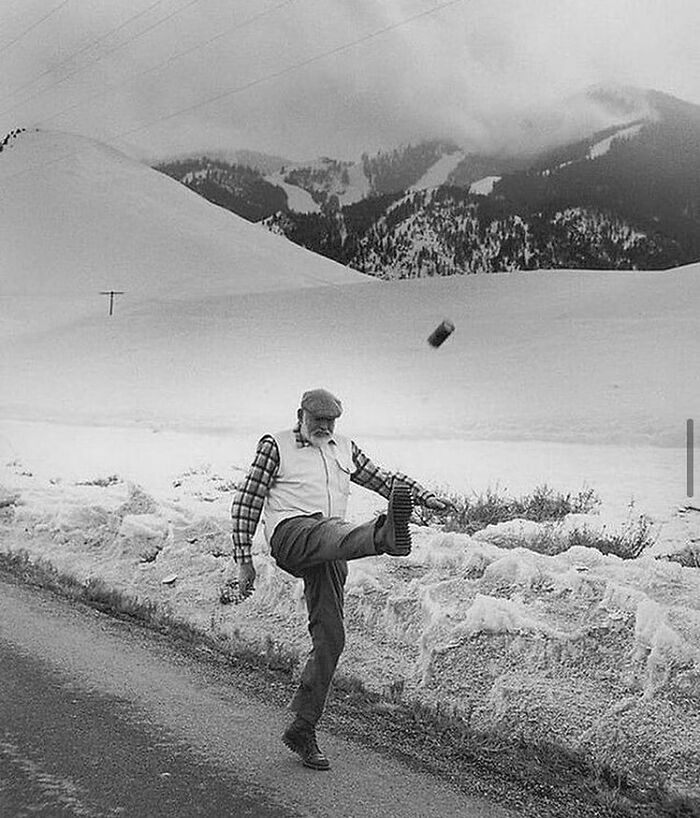
Image credits: historicaleaks
#56 Bride Leaving Her Recently Bombed Home To Get Married, London, 1940
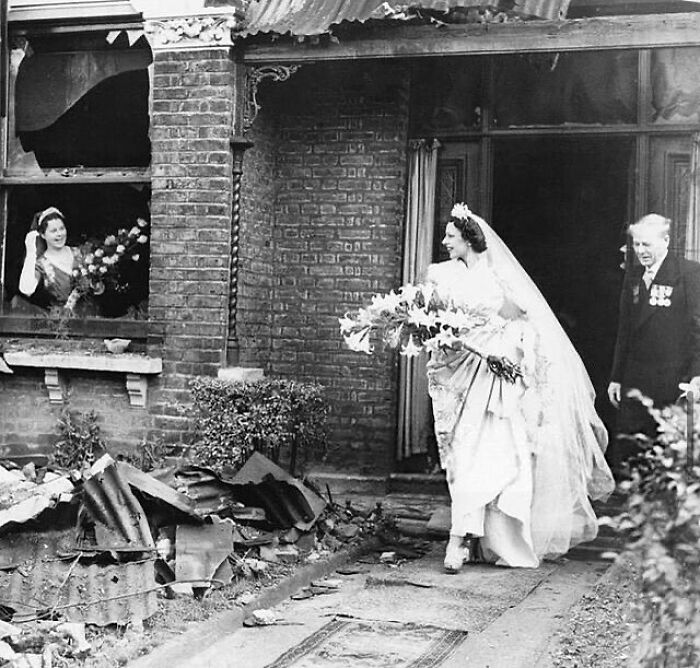
Image credits: historicaleaks
#57 The Last Known Photo Of The Titanic, April 11, 1912
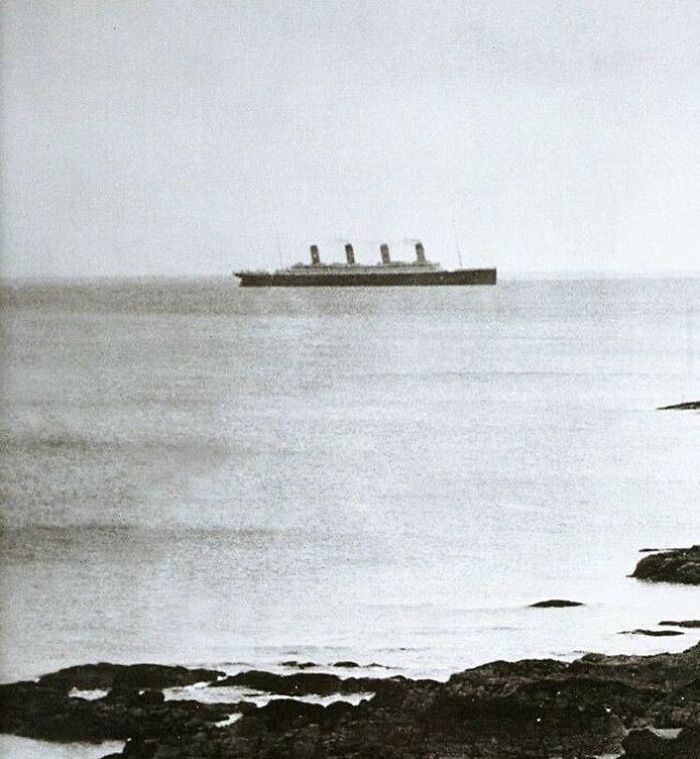
Image credits: historicaleaks
#58 A Young Miner Boy In Utah Or Colorado, USA, In The Early 1900s
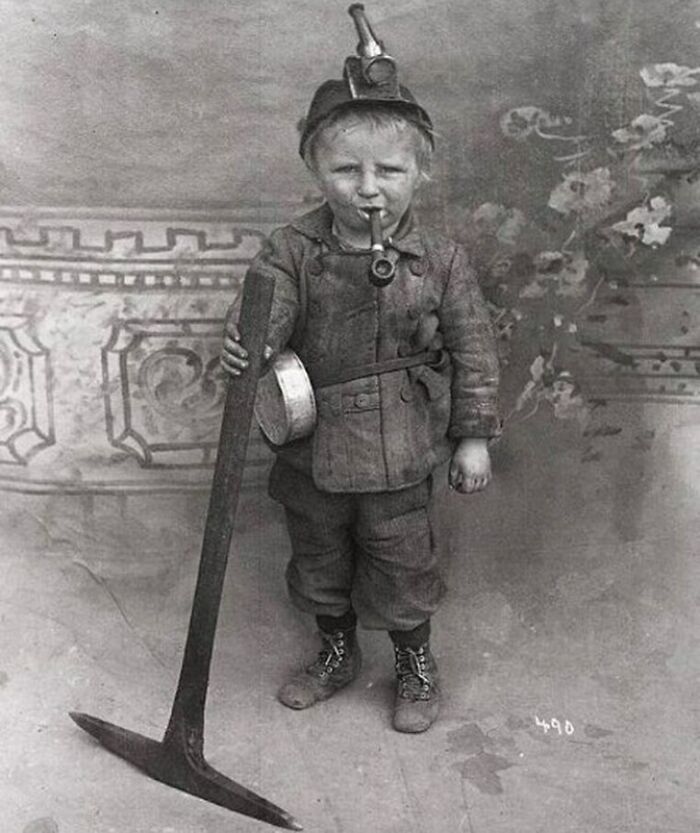
Image credits: historicaleaks
#59 The Inside Of A Comercial Airplane In 1930
Under the ripping panel it says: "In case of emergency, pull ring sharply." Original caption: “The ripping panel tore away from around the window, allowing the window to be removed or folded down, allowing the passengers to exit in an emergency. If you zoom in on the windows, you'll notice a loop of material above each window. The aircraft is an Imperial Airlines biplane called a Handley Page W10 (swipe left to see its exterior). The first prototype was built in 1919 and it started commercial flights in the early 1920s until it was retired in 1934. The aircraft had an enclosed cabin that fit 12 passengers and two crew members in an open cockpit. It was also the first airliner to have a bathroom on onboard.”
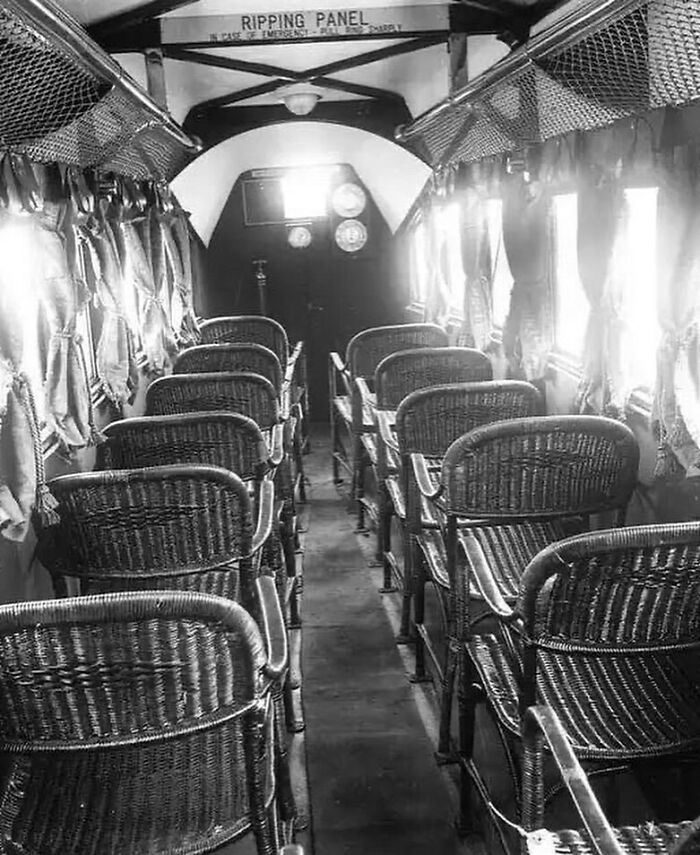
Image credits: historicaleaks
#60 A Delivery Man With Bags Filled With Baguettes On A Snowy Street In Quebec, Canada, 1977
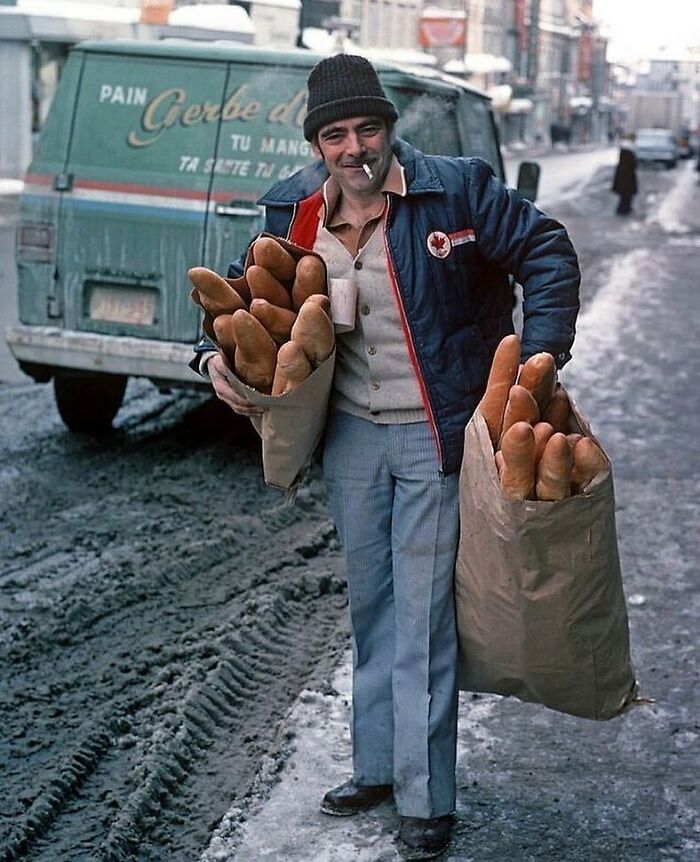
Image credits: historicaleaks
#61 A Great Depression Christmas Dinner In Home Of Earl Pauley, Near Smithfield, Iowa, 1936
The dinner consisted of potatoes, cabbage and pie, 1936. Many years later, Helen Pauley Hopkins, one of the children in the photo was interviewed when she was in her 70s. “I remember one Christmas where Dad made us a whistle out of a corn cob. He put three feathers on the top of the cob. He’d throw it in the air and it would make a whistle on its way down. I was two when this picture was taken. We lived one day at a time. We always waited for father to get home from work, so we could sit at the table and eat with him. I worked as a janitor at Maple Valley school. But I kind of put my life aside to care for family members. I was with both of my parents and my siblings when they died. I think my mother had to put up with hell to live like this. She was such a wonderful person. Truth be known, she went without to see we had what we needed. There wasn’t a night when my parents didn’t tell us all how much they loved us. That meant the world to me.” For most families during the Great Depression, Christmas was not a time for extravagance. Money and jobs were difficult to come by, and it was all some families could do to keep food on the table. The Great Depression was a severe worldwide economic depression in the decade preceding WWII. Farming and rural areas suffered as crop prices fell. The Great Depression began in the United States as an ordinary recession in the summer of 1929. The downturn became markedly worse, however, in late 1929 and continued until early 1933. Real output and prices fell precipitously. Between the peak and the trough of the downturn, industrial production in the United States declined 47 percent and real gross domestic product (GDP) fell 30 percent
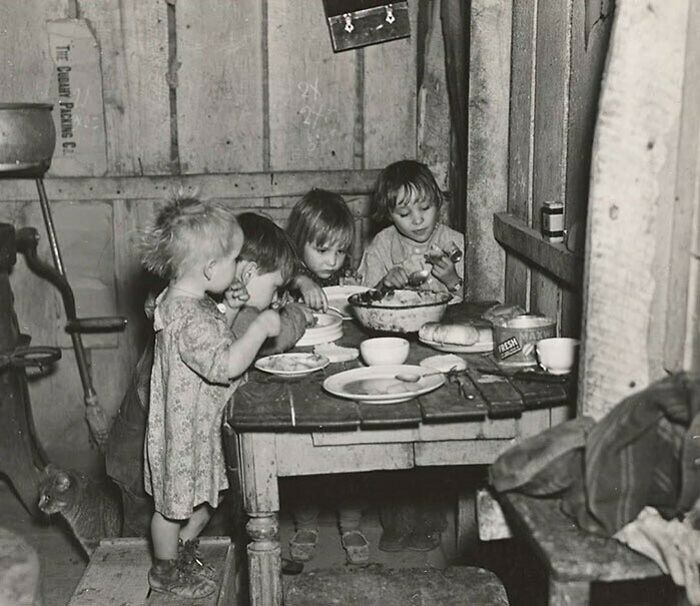
Image credits: historicaleaks
#62 New York City Subway, 1970s

Image credits: historicaleaks
#63 A German Soldier Returns Home From War Only To Find His House Bombed, And Family Perished In The Remains, Frankfurt, 1946
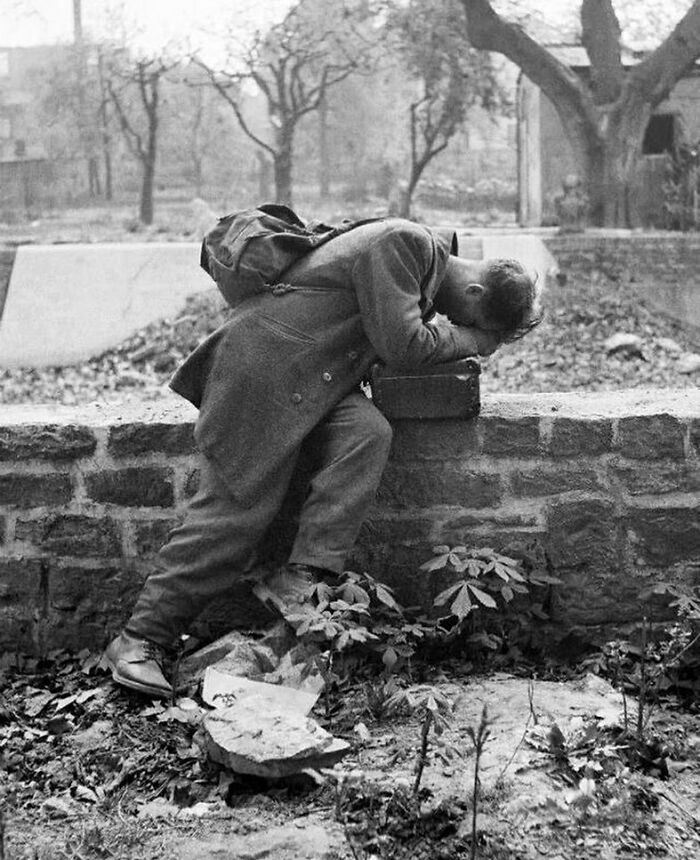
Image credits: historical.leaks
#64 Milkman During The London Blitz, 1940
The Blitz was a German bombing campaign against the United Kingdom in 1940 and 1941. For eight months the Luftwaffe dropped bombs on London and other strategic cities across Britain. The attacks were authorized by Germany’s chancellor, Adolf Hitler, after the British carried out a nighttime air raid on Berlin. On July 16, 1940, Hitler issued a directive ordering the preparation and, if necessary, execution of Operation Sea Lion, the amphibious invasion of Great Britain. With Britain’s powerful Royal Navy controlling the surface approaches in the Channel and the North Sea, it fell to the Luftwaffe to establish dominance of the skies above the battle zone. On August 2, Luftwaffe commander Hermann Göring issued his “Eagle Day” directive, laying down a plan of attack in which a few massive blows from the air were to destroy British air power and so open the way for the invasion. A victory for the Luftwaffe in the Battle of Britain would indeed have exposed Great Britain to invasion and occupation. Victory for the Royal Air Force’s (RAF’s) Fighter Command blocked this possibility and, in fact, created the conditions for Britain’s survival and the eventual destruction of the Third Reich
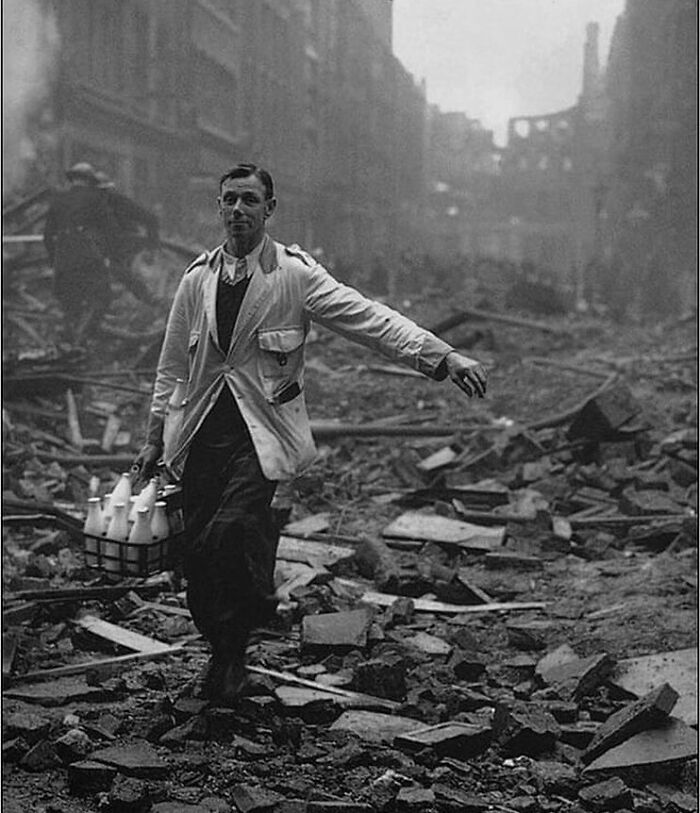
Image credits: historical.leaks
#65 A Young 19-Year-Old Teddy Roosevelt At Harvard, 1877
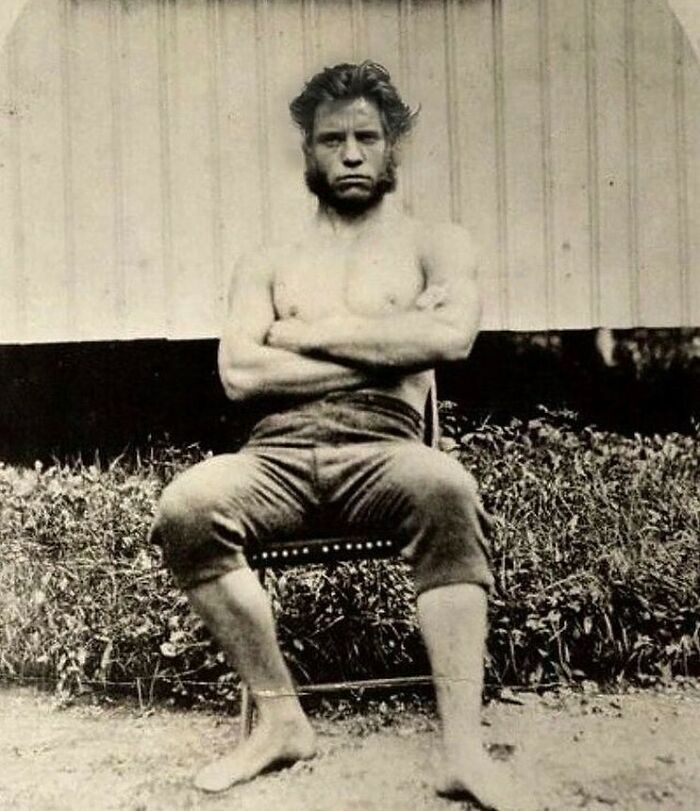
Image credits: historicaleaks
#66 This Is George Moore Aka The Living Skeleton And Fred Howe Aka The Fatman Who Were Sideshow Perfomers From The Late 19th Century
Caption from Strand Magazine, 1897: "...Fred Howe’s father was a carpenter at Alleghany City, Penn., and Fred started to learn the same trade, but soon became too fat. At the age of eighteen he joined the Forepaugh Circus as a “fat boy,” and there met his present sparring partner. George Moore was born in Helena, Montana, where his father had a little dry goods shop. Until he was twenty-one years of age George worked in his father’s shop. But his greatest desire was to see the world. When the first big circus came to Helena, the manager offered him an engagement to exhibit himself as the “living skeleton,” and he closed with the offer at once. Fred Howe, they soon became great friends. The doctors advised both to take as much exercise as possible—the one to gain flesh, and the other to get rid of it. These smart Yankee lads then resolved to combine duty with pleasure, so they went in for boxing. For a long time they practised privately. One day, however, the manager was told of the fun by some of his “freaks,” who had been allowed to see a "set-to” between the two gladiators. The manager then arranged a round or two, and the moment he saw Howe and Moore face each other, he offered them a long engagement at an increased salary, if only they would do their boxing before the public. To-day these funny fellows are not only expert boxers, but also perfect comedians in their “art.” Their boxing is uproariously funny. Moore is 6ft. 3in. in height, and weighs but 97lb., whilst Howe is only 4ft. 2in. high, and weighs exactly 422lb."
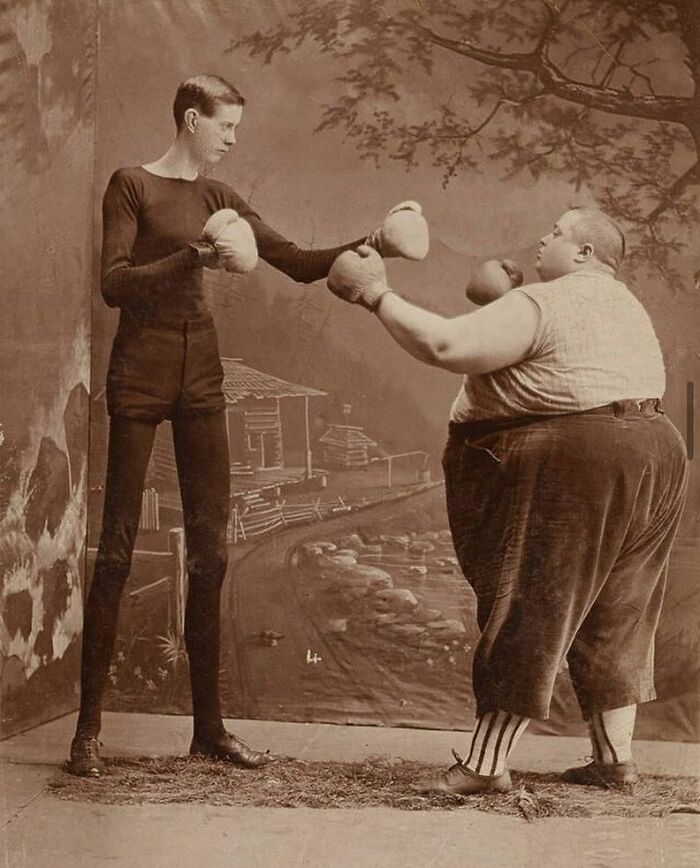
Image credits: historicaleaks
#67 Pictured Is Christopher Mccandless (1968-1992), Also Known As Alexander Supertramp, An Adventurous American Hiker Who After Graduating Decided To Travel Around The United States, Making His Way To Alaska
After graduating from college in 1990, McCandless donated his savings of 24,000$. However, briefly into his adventure, his car broke down and he continued his journey on foot. To get to Alaska, he began hitchhiking and worked various oddjobs to earn some money to survive. During his time in Alaska, he lived on an abandoned bus (Fairbanks City Transit System Bus 142) that was located near Denali National Park. During his adventure McCandless had a camera and a diary. The last words he wrote were: “I have had a happy life and thank the Lord. Goodbye and may God bless all! ” The photo above was found undeveloped in his camera after his death. It is known that he passed away in August 1992, but the exact day is unknown. His decomposing body was found by hunters in September 1992, and weighed 67 pounds (30 kilograms)
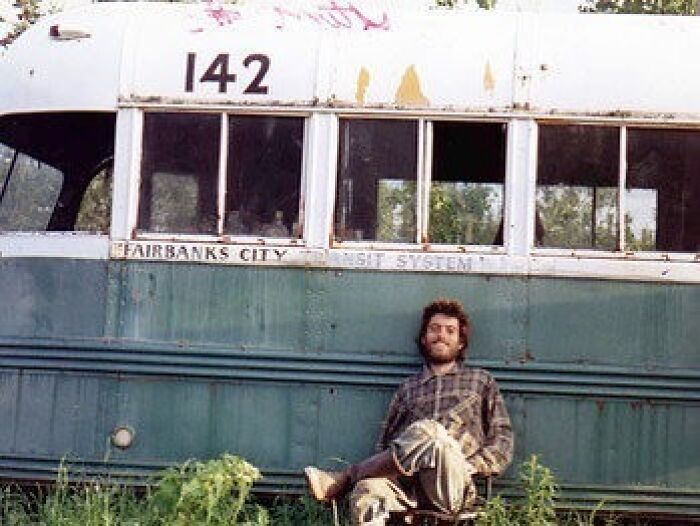
Image credits: historicaleaks
#68 Group Taking A Selfie, 1920
The first time a photographic self-portrait was taken using the same process as today, with the photographer holding the camera at arm’s length, was in December 1920. The five men who took the photo were the main photographers of the Byron Company; a photography studio founded in Manhattan in 1892 and still in business today. Another man took a photograph of the men documenting the momentous occasion. The image shows the five men standing on the roof of the Marceau Studio holding an antediluvian analog camera that was so heavy it required two of the men to hold it up. In photography, self-portraits were taking place long before the invention of Facebook and smartphones. One example is American photographer Robert Cornelius, who took a self-portrait daguerreotype (the first practical process of photography) of himself in 1839. The image is also considered one of the earliest photographs of a person. In 1914, 13-year-old Russian Grand Duchess Anastasia Nikolaevna took a self-portrait using a Kodak Brownie box camera (invented in 1900) and sent the photograph to a friend with the following note "I took this picture of myself looking at the mirror. It was very hard as my hands were trembling." Nikolaevna appears to have been the first teenager to take a selfie. The word "selfie" was chosen as the "Word of the Year" in 2013 by the Oxford English Dictionary, which has the following entry for the word: "A photograph that one has taken of oneself, typically with a smartphone or webcam and uploaded to a social media website."
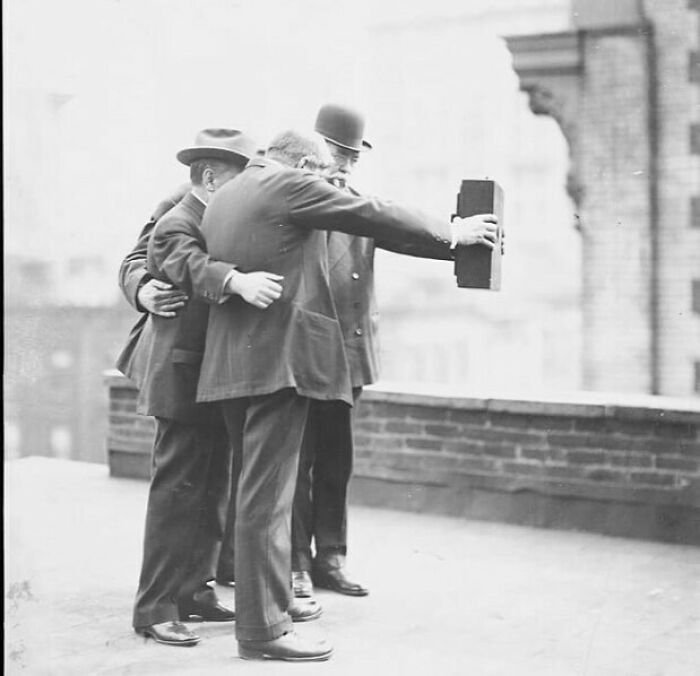
Image credits: historicaleaks
#69 Warsaw, Poland 76 Years Ago vs. Today
Before World War II, the city was a major center of Jewish life and culture in Poland. Warsaw's prewar Jewish population of more than 350,000 constituted about 30 percent of the city's total population. Following the German invasion of Poland on September 1, 1939, Warsaw suffered heavy air attacks and artillery bombardment. German troops entered Warsaw on September 29, shortly after its surrender. The Warsaw Uprising was a major World War II operation, in the summer of 1944, by the Polish underground resistance, led by the Polish resistance Home Army, to liberate Warsaw from German occupation. The Uprising was fought for 63 days with little outside support. It was the single largest military effort taken by any European resistance movement during World War II. During the Warsaw Uprising in August 1944, more than 85% of Warsaw's historic centre was destroyed by Nazi troops. After the war, a five-year reconstruction campaign by its citizens resulted in today's meticulous restoration of the Old Town, with its churches, palaces and market-place
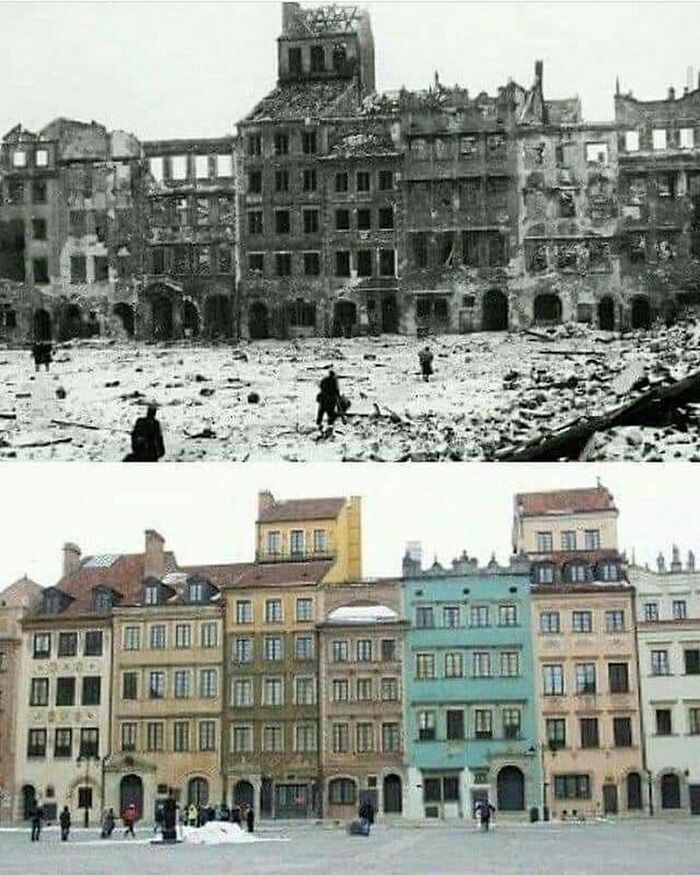
Image credits: historicaleaks
#70 French Boys Holding Their Mother’s Pocketbooks, 1962
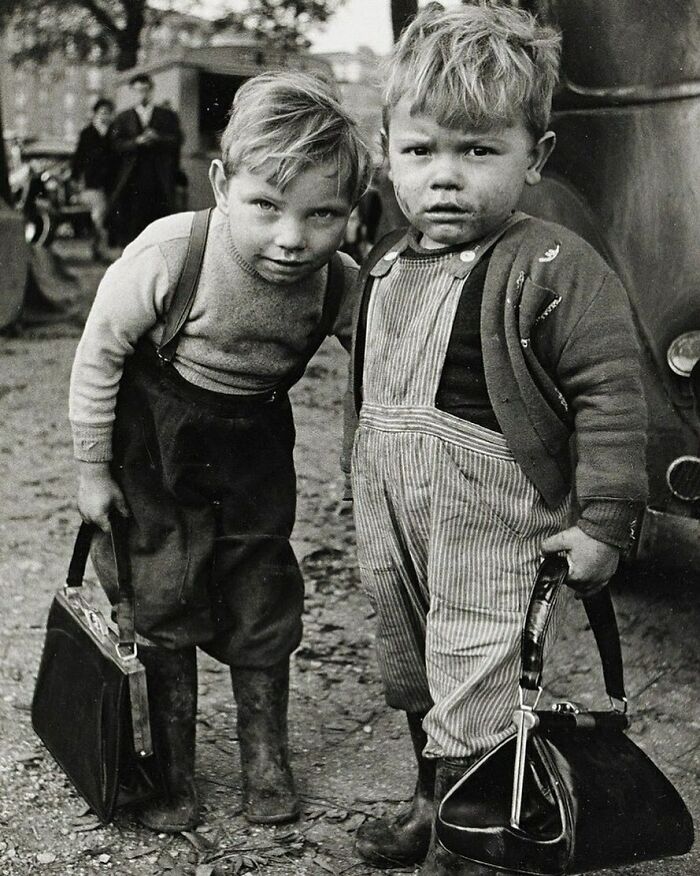
Image credits: historicaleaks
#71 Freddy Mercury And His Mother, 1947
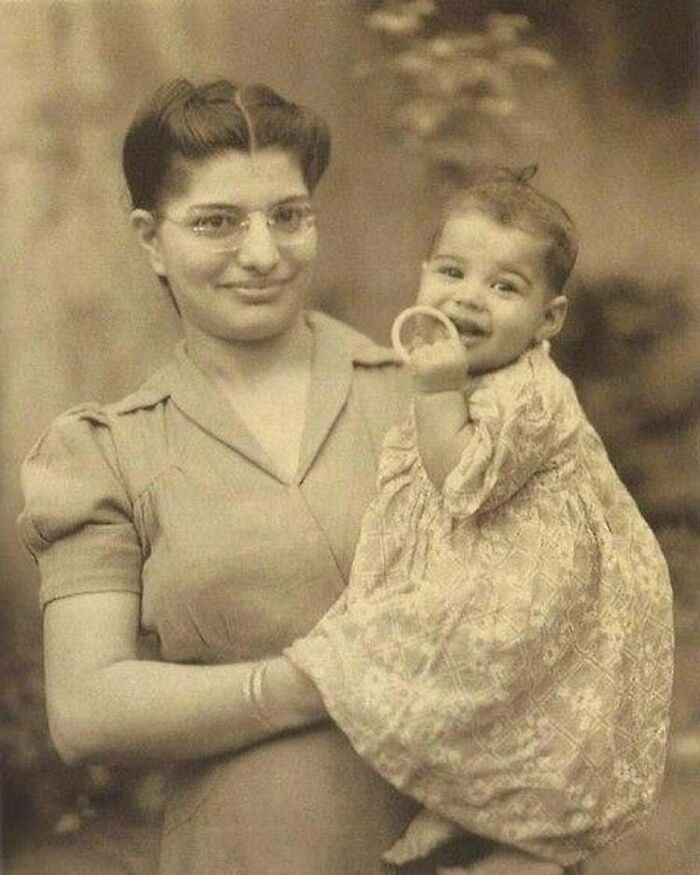
Image credits: historicaleaks
#72 Hand Belonging To An X-Ray Technician At The Royal London Hospital, Which Shows The Damage From Radiation Exposure, 1900
Wilhelm Roentgen, Professor of Physics in Wurzburg, Bavaria, discovered X-rays in 1895—accidentally—while testing whether cathode rays could pass through glass. His cathode tube was covered in heavy black paper, so he was surprised when an incandescent green light nevertheless escaped and projected onto a nearby fluorescent screen. Through experimentation, he found that the mysterious light would pass through most substances but leave shadows of solid objects. Because he did not know what the rays were, he called them ‘X,’ meaning ‘unknown,’ rays. Roentgen quickly found that X-rays would pass through human tissue too, rendering the bones and tissue beneath visible. News of his discovery spread worldwide, and within a year, doctors in Europe and the United States were using X-rays to locate gun shots, bone fractures, kidney stones and swallowed objects. Honors for his work poured in--including the first Nobel Prize in physics in 1901. In today’s world, doctors order X-rays to diagnose all sorts of problems: a broken bone, pneumonia, heart failure, and much, much more. Mammography, the standard screening method for breast cancer, uses X-rays
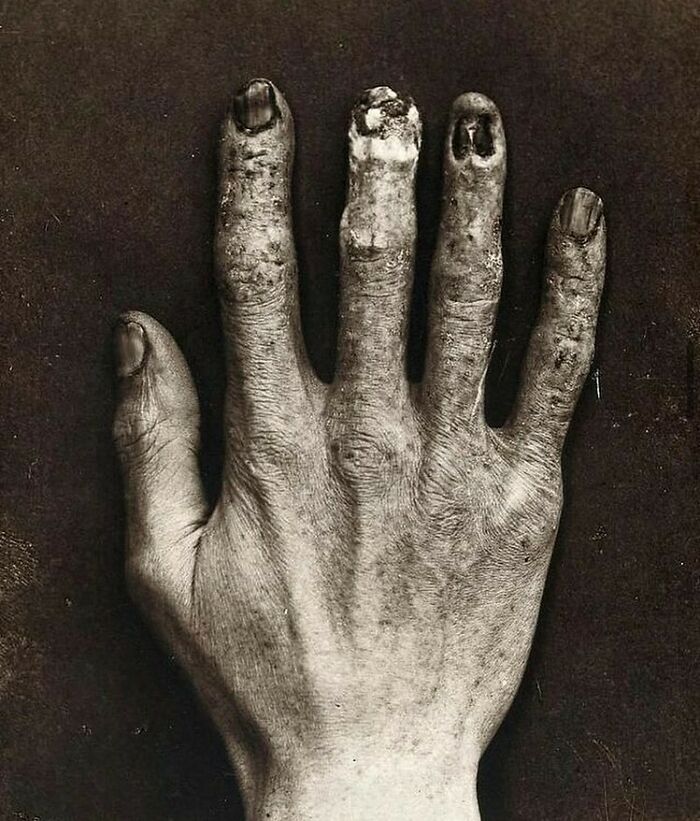
Image credits: historicaleaks
#73 2 Year-Old Elvis Presley With His Parents, 1937
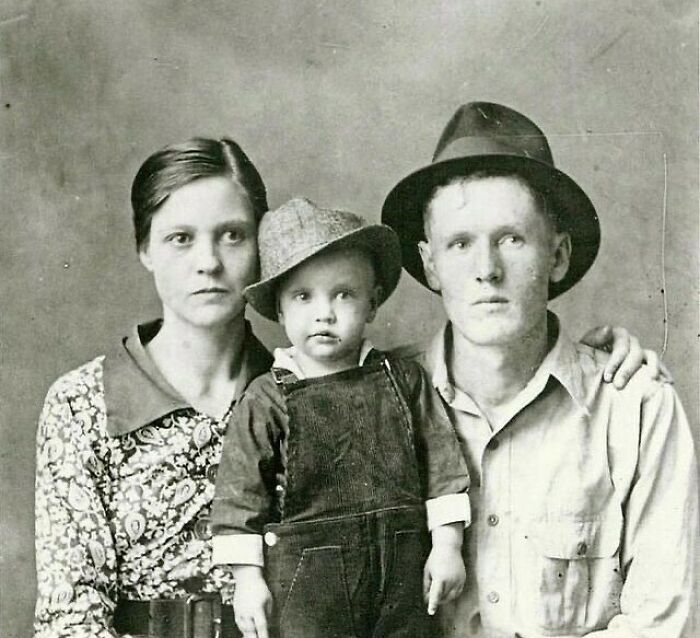
Image credits: historicaleaks
#74 Portrait Of A Family In Gainesville, Florida, C. 1900s
The nineteenth and twentieth centuries were a time of radical transformation in the political and legal status of African Americans. Americans were freed from slavery and began to enjoy greater rights as citizens (though full recognition of their rights remained a long way off)
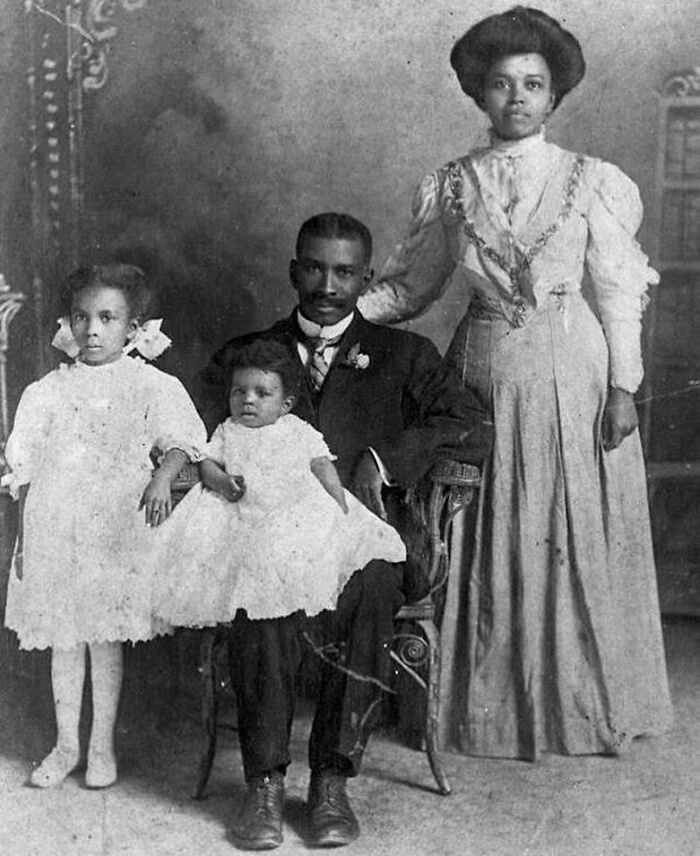
Image credits: historicaleaks
#75 Night Fishing, Hawaii, 1948
Hawaiians used spears to fish in shallows or along rocky ledges, or underwater to catch rock fishes. Hard woods like kauila, o`a, koai`e, and uhiuhi were favored for spears. Finished spears were six or seven feet long, slim and sharply pointed at one end. Night spear fishing inside the reef was done by the light of kukui-nut torches as the bright light attracted fish in shallow waters. Fishermen made torches out of kukui nuts wrapped in leaves on top of a pole. The lamaku was a large torch made out of a short piece of the coconut leaf midrib. On the midrib, they would string kukui kernels to make the torch. If the Hawaiians wanted a brighter light they put roasted kukui nuts in a hollow piece of bamboo and lit them. Ancient Hawaiians drew their sustenance – physical and spiritual – from the land and sea around them. Guided by a philosophy that paired a cycle of cultivating and harvesting plants and animals with conservation of those resources, they lived in balance with their environment. Within this context, fishing held a central role. Seafood provided the primary protein in the Hawaiian diet, complementing vegetable staples such as taro, sweet potato and breadfruit. Ocean resources were so important that the ahupua`a system of land division ensured each district had access to the sea along a swath of shoreline and beyond to fisheries. Within each pie-shaped division, fishing communities exchanged with upland farmers, supplying fish, shellfish, seaweed, and salt to the entire district. Fishermen maintained personal and spiritual relationships with the sea, acquiring extensive knowledge of shore and reef areas, honing their diving skills to locate fish, spear fish, free nets, and set traps. The many proverbs, prayers, and tales attest to the importance of fishing in Hawaiian culture. A successful fisherman was a highly valued asset for his entire community. The historian Kamakau wrote that the fortunate fisherman “was like a lucky woman who attracts men by the fragrance of her skin”
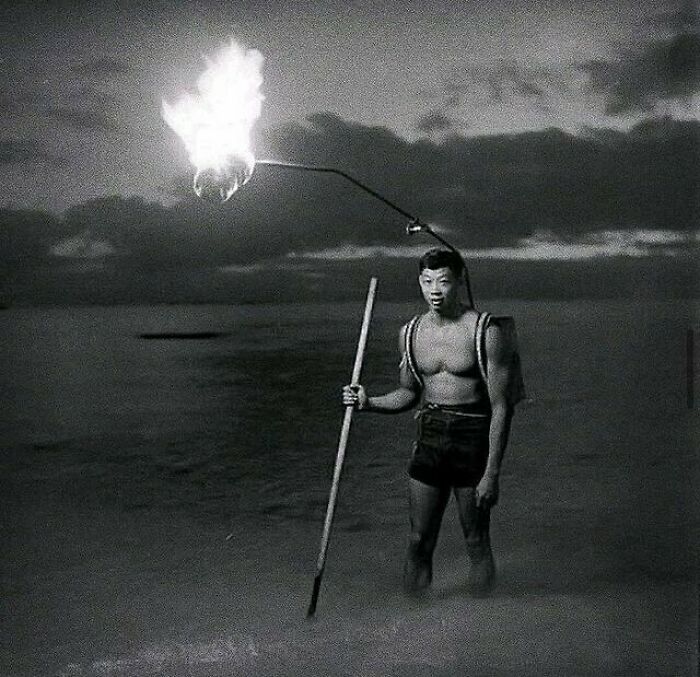
Image credits: historicaleaks
#76 Barack Obama With His Mother On Halloween, 1964
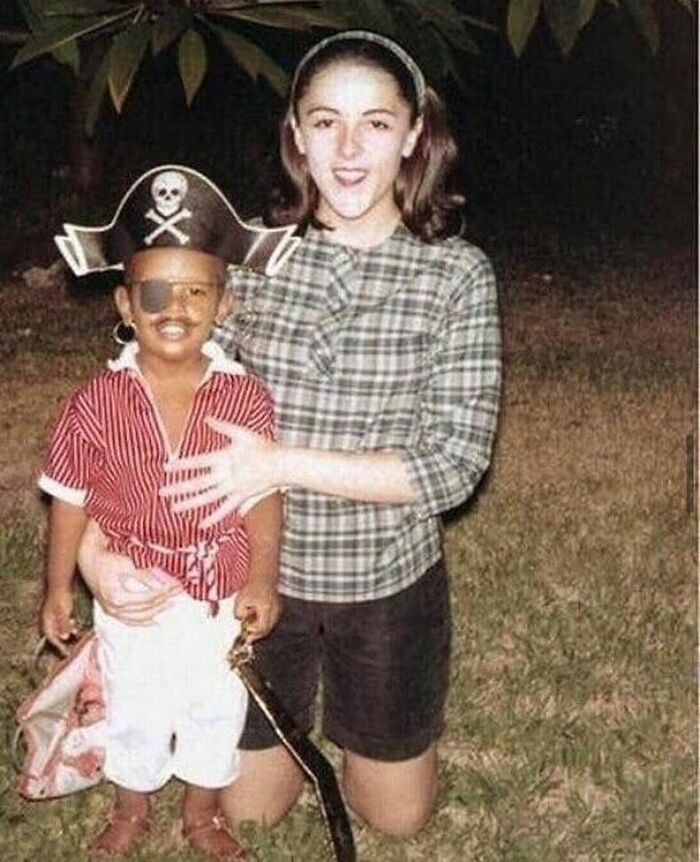
Image credits: historicaleaks
#77 A Toddler With Soviet Marine Soldiers Taking Care Of Because Her Parents Died, Siege Of Leningrad
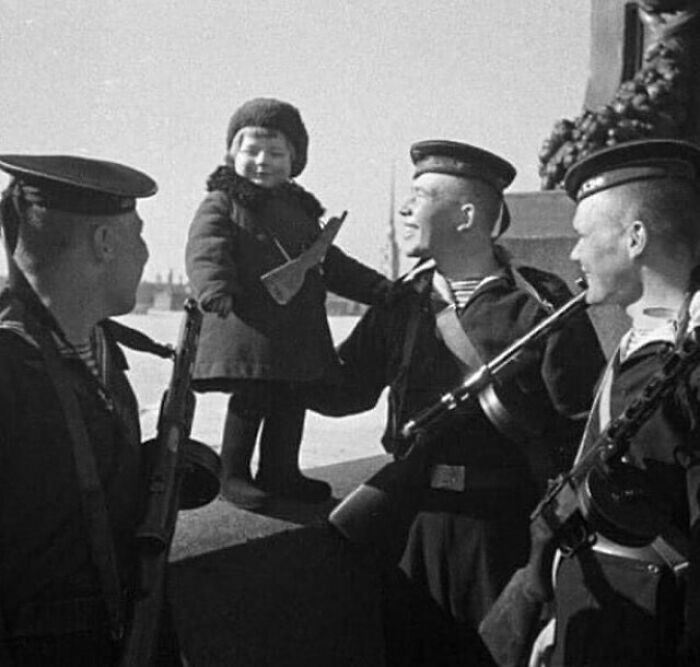
Image credits: historical.leaks
#78 A Child With Bread And Milk, Istanbul, Turkey, 1989
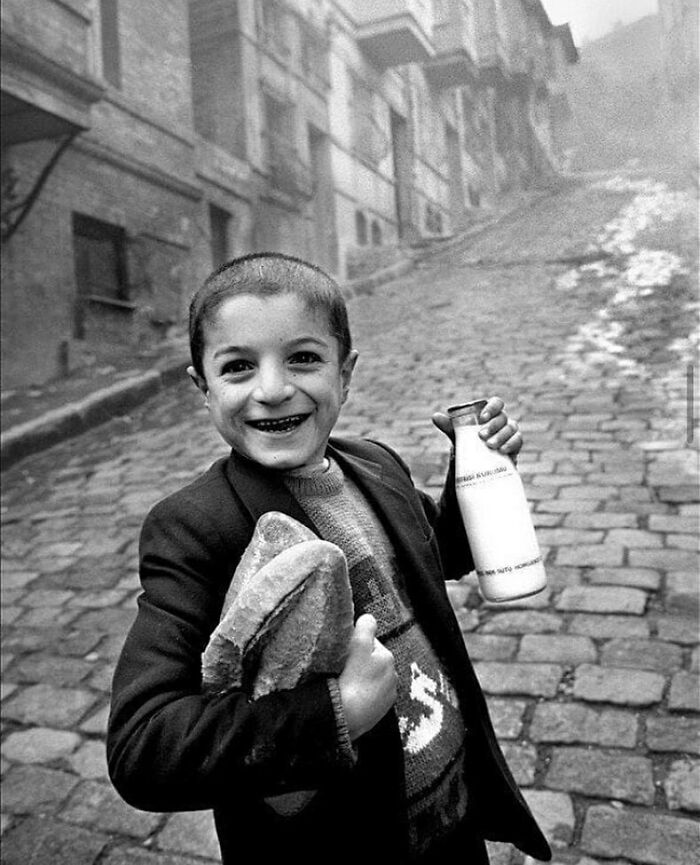
Image credits: historicaleaks
#79 Child Laborers, Newsboys Smoking Cigarettes, St. Louis, Missouri. 1910
For a small amount of perspective at this moment, imagine you were born in 1900. When you are 14, World War I starts, and ends on your 18th birthday with 22 million people killed. Later in the year, a Spanish Flu epidemic hits the planet and runs until you are 20. Fifty million people die from it in those two years. Yes, 50 million. When you're 29, the Great Depression begins. Unemployment hits 25%, global GDP drops 27%. That runs until you are 33. The country nearly collapses along with the world economy. When you turn 39, World War II starts. You aren’t even over the hill yet. When you're 41, the United States is fully pulled into WWII. Between your 39th and 45th birthday, 75 million people perish in the war and the Holocaust kills six million. At 52, the Korean War starts and five million perish. At 64 the Vietnam War begins, and it doesn’t end for many years. Four million people die in that conflict. Approaching your 62nd birthday you have the Cuban Missile Crisis, a tipping point in the Cold War. Life on our planet, as we know it, could well have ended. Great leaders prevented that from happening. As you turn 75, the Vietnam War finally ends. Think of everyone on the planet born in 1900. How do you survive all of that? A kid in 1985 didn’t think their 85 year old grandparent understood how hard school was. Yet those grandparents (and now great grandparents) survived through everything listed above. Perspective is an amazing art. Let’s try and keep things in perspective. Let’s be smart, help each other out, and we will get through all of this. In the history of the world, there has never been a storm that lasted. This too, shall pass.
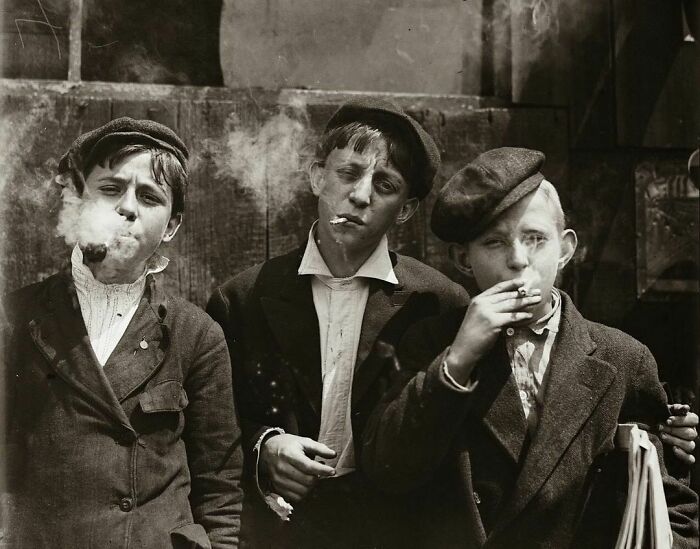
Image credits: historicaleaks
#80 An Inuit Man Warms Up His Wife’s Feet In Greenland, 1890s
Inuit are a group of culturally similar indigenous peoples inhabiting the Arctic regions of Greenland, Canada and Alaska. The Inuits have been living in Greenland and near the Arctic Circle for generations longer than anyone else who’s spent time in these frosty areas - so if they’re cold then you know you’d be freezing. The Inuit people stretch across the north, from Greenland to Canada, and during the 19th century they were somewhat nomadic. In the 1850s the Inuit were hired by whalers from Britain and New England to help with the large-scale operations that were staring up in the 19th century. This pic was likely captured on a break from a hard day’s work. The female Inuk has put her kamiit (thigh high boots) next to her. Female Inuit wear high kamiit (thigh high boots) which are made of sealskin and with polar bear skins at the edge. The trousers are short which are made of sealskin and go to the upper part of the thigh. These materials are still the best protection against the cold, which at times can be below minus 40 degrees Celsius
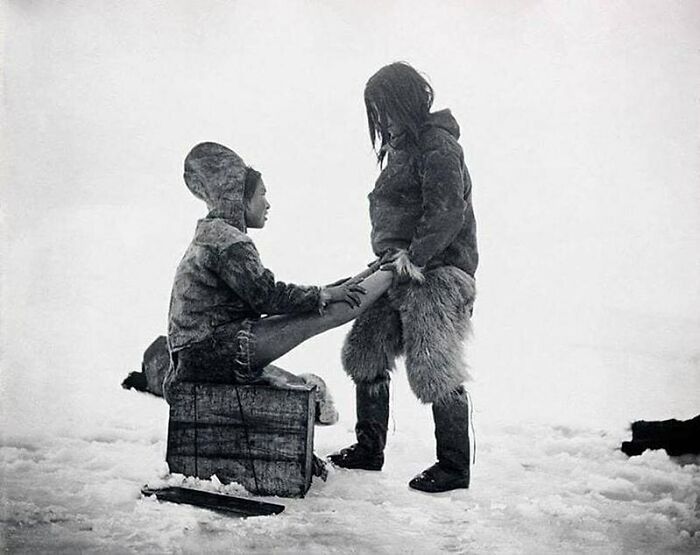
Image credits: historicaleaks
#81 The First Disneyland Admission Ticket Ever Sold
The first tickets to Disneyland were sold on July 18, 1955. While the cost of an adult ticket was $1.00 and 50 cents for children, 9 cents of that price went to a Federal tax, which was abolished in 1956

Image credits: historicaleaks
#82 A Photo From The Bush To Obama Transition, 2009
Here's an excerpt from a letter written by Barbara and Jenna Bush to Sasha and Malia. "...Sasha and Malia, here is some advice to you from two sisters who have stood where you will stand and who have lived where you will live: —Surround yourself with loyal friends. They'll protect and calm you and join in on some of the fun, and appreciate the history. —If you're traveling with your parents over Halloween, don't let it stop you from doing what you would normally do. Dress up in some imaginative, elaborate costume (if you are like us a pack of Juicy Fruit and a Vampiress) and trick-or-treat down the plane aisle. —If you ever need a hug, go find Ramsey. If you want to talk football, look for Buddy. And, if you just need a smile, look for 'Smiley.' —And, a note on White House puppies—our sweet puppy Spot was nursed on the lawn of the White House. And then of course, there's Barney, who most recently bit a reporter. Cherish your animals because sometimes you'll need the quiet comfort that only animals can provide. —Slide down the banister of the solarium, go to T-ball games, have swimming parties, and play Sardines on the White House lawn. Have fun and enjoy your childhood in such a magical place to live and play. —When your dad throws out the first pitch for the Yankees, go to the game. —In fact, go to anything and everything you possibly can: the Kennedy Center for theater, State Dinners, Christmas parties (the White House staff party is our favorite!), museum openings, arrival ceremonies, and walks around the monuments. Just go. Four years goes by so fast, so absorb it all, enjoy it all! ...Many people will think they know him, but they have no idea how he felt the day you were born, the pride he felt on your first day of school, or how much you both love being his daughters. So here is our most important piece of advice: remember who your dad really is."
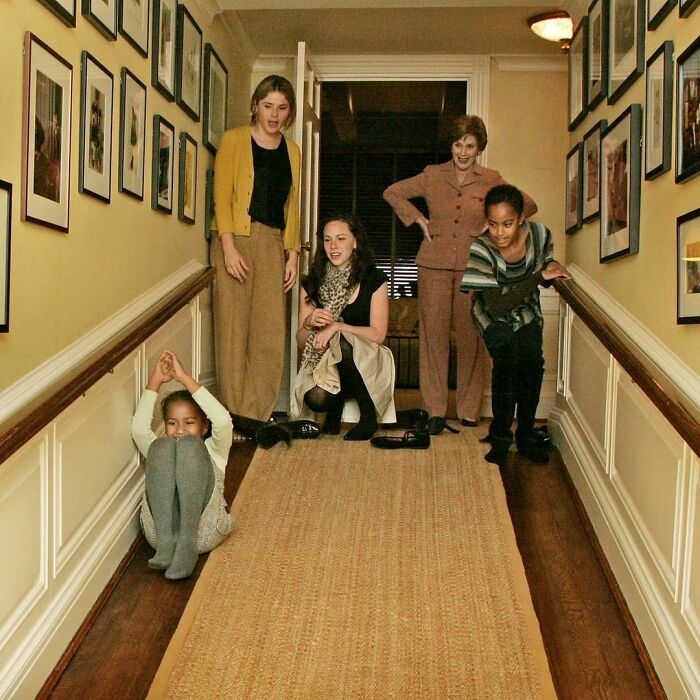
Image credits: historicaleaks
#83 The Twin Towers In 1979. Photographed By @louisstettnerestatethe Twin Towers In 1979. Photographed By @louisstettnerestatethe Twin Towers In 1979. Photographed By @louisstettnerestatethe Twin Towers In 1979. Photographed By @louisstettnerestate

Image credits: historicaleaks
#84 Dr. Lewis Sayre Treating Scoliosis, Checking The Curvature Of The Spine, 1870s
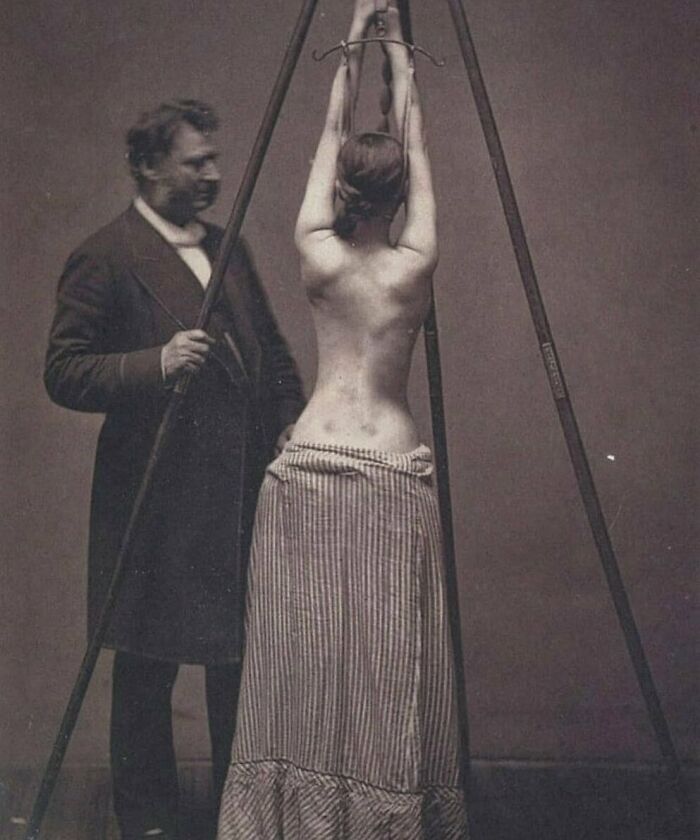
Image credits: historicaleaks
#85 Marylin Monroe Performing For The Troops, Korea, 1954
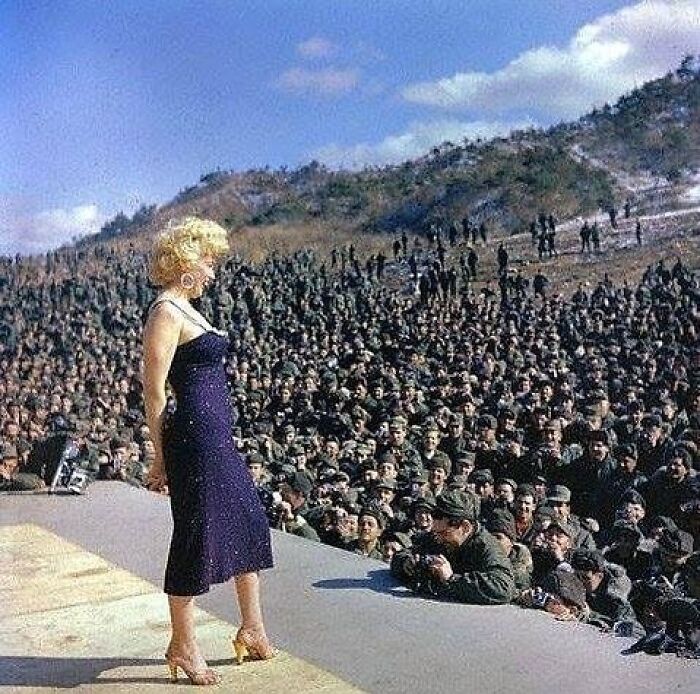
Image credits: historicaleaks
#86 A Nagasaki Survivor, 1945. The United States Detonated Two Nuclear Weapons Over The Japanese Cities Of Hiroshima And Nagasaki On 6 And 9 August 1945, Respectively
The two bombings killed between 129,000 and 226,000 people, most of whom were civilians, and remain the only use of nuclear weapons in armed conflict. Even before the outbreak of war in 1939, a group of American scientists—many of them refugees from fascist regimes in Europe—became concerned with nuclear weapons research being conducted in Nazi Germany. In 1940, the U.S. government began funding its own atomic weapons development program, which came under the joint responsibility of the Office of Scientific Research and Development and the War Department after the U.S. entry into World War II. The U.S. Army Corps of Engineers was tasked with spearheading the construction of the vast facilities necessary for the top-secret program, codenamed “The Manhattan Project” (for the engineering corps’ Manhattan district). Over the next several years, the program’s scientists worked on producing the key materials for nuclear fission—uranium-235 and plutonium (Pu-239). They sent them to Los Alamos, New Mexico, where a team led by J. Robert Oppenheimer worked to turn these materials into a workable atomic bomb. Early on the morning of July 16, 1945, the Manhattan Project held its first successful test of an atomic device—a plutonium bomb—at the Trinity test site at Alamogordo, New Mexico
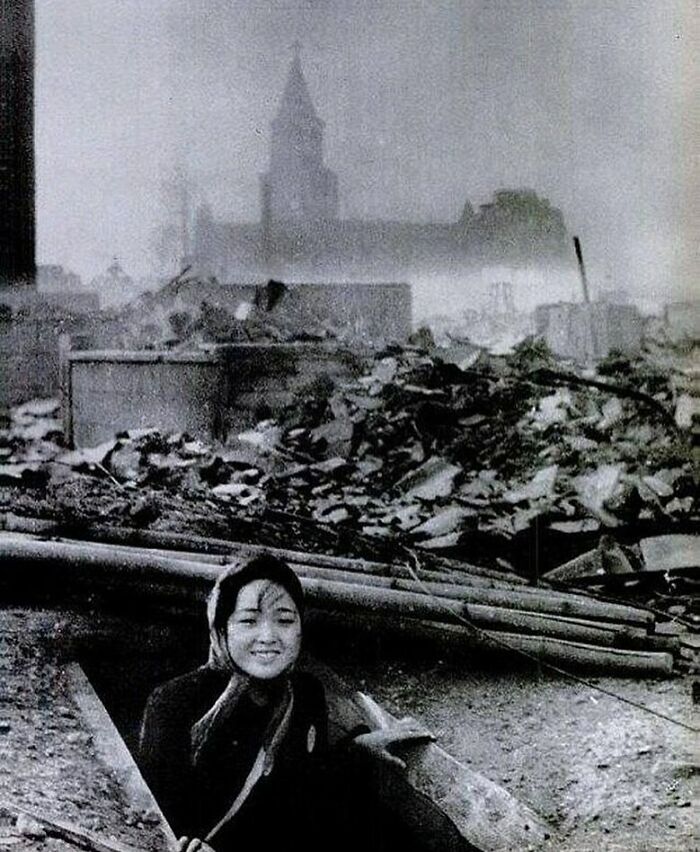
Image credits: historical.leaks
#87 French Woman Pours A Cup Of Tea For A British Soldier Fighting In Normandy, 1944
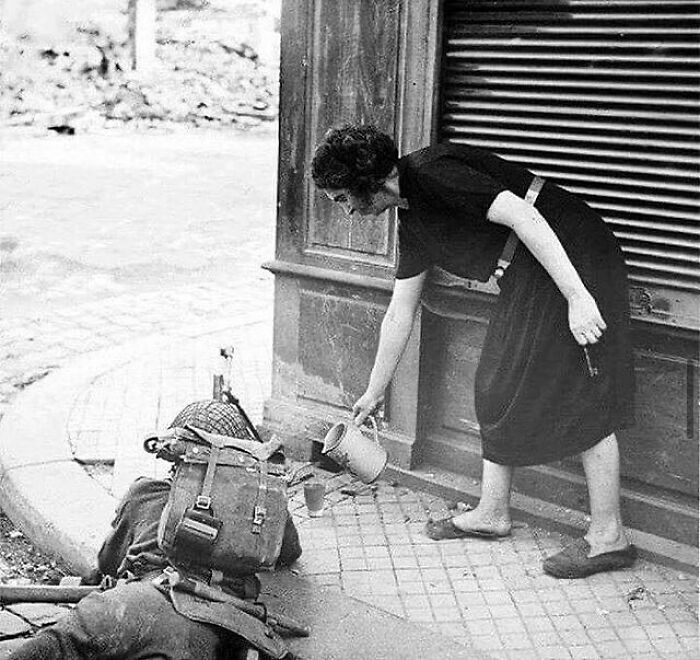
Image credits: historical.leaks
#88 Women’s Royal Army Corps Member Showing New Tattoo On Leg To Fellow Enlistees During World War II
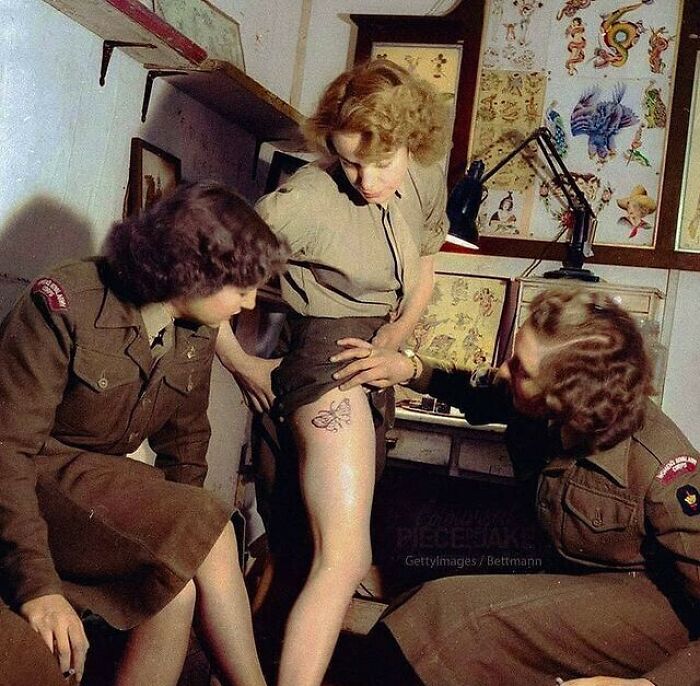
Image credits: historical.leaks
#89 On Sept. 11, 2001, Andrea Haberman Started Her Day With A Playful Ritual She And Her Fiancé Shared Whenever They Were Apart: Whoever Called The Other First Thing In The Morning Won The Competition
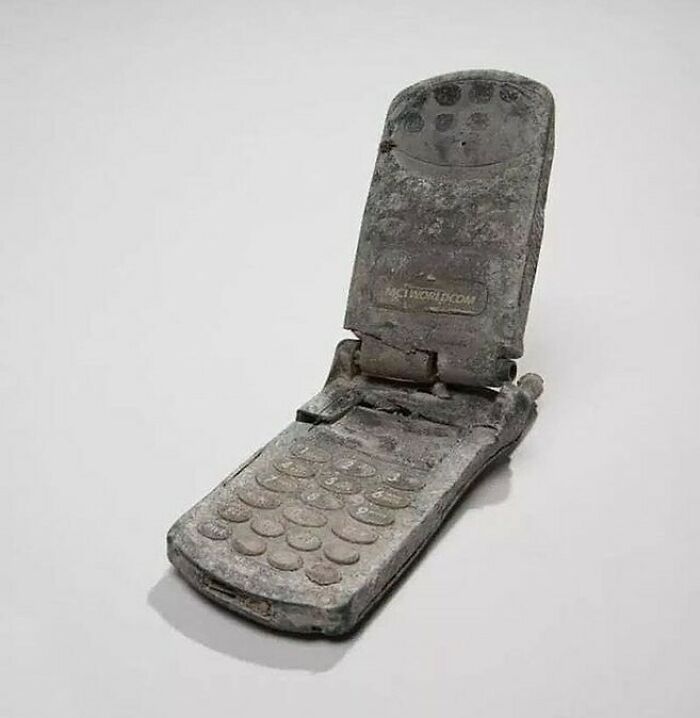
Image credits: historicaleaks
#90 The Moment Goebbels (Minister Of Nazi Propaganda) Found Out His Photographer Eisenstaedt Was Jewish, 1933
This photo is known as "Eyes of Hate". In September 1933, LIFE magazine photographer Alfred Eisenstaedt traveled to Geneva to document a meeting of the League of Nations. Eisenstaedt was a German-born Jew. Not knowing this at first, Goebbels was initially friendly toward Eisenstaedt, who was able to capture a number of photos showing the Nazi politician in a good and cheerful mood. However, Goebbels soon learned of the Jewish blood flowing through Eisenstaedt's veins. Subsequently, when Eisenstaedt approached Goebbels for a candid portrait, the politician's expression was very, very different. Here's what Eisenstaedt later shared regarding experience: "I found him sitting alone at a folding table on the lawn of the hotel. I photographed him from a distance without him being aware of it. As documentary reportage, the picture may have some value: it suggests his aloofness. Later found him at the same table surrounded by aides and bodyguards. Goebbels seemed so small, while his bodyguards were huge. I walked up close and photographed Goebbels. It was horrible. He looked up at me with an expression full of hate. The result, however, was a much stronger photograph. There is no substitute for close personal contact and involvement with a subject, no matter how unpleasant it may be. He looked at me with hateful eyes and waited for me to wither. But I didn't wither. If I have a camera in my hand, I don't know fear." On August 14, 1945, Eisenstaedt photographed a sailor celebrating Japan's surrender by kissing a random nurse in New York City. The photo came to be known as “V-J Day in Times Square.”
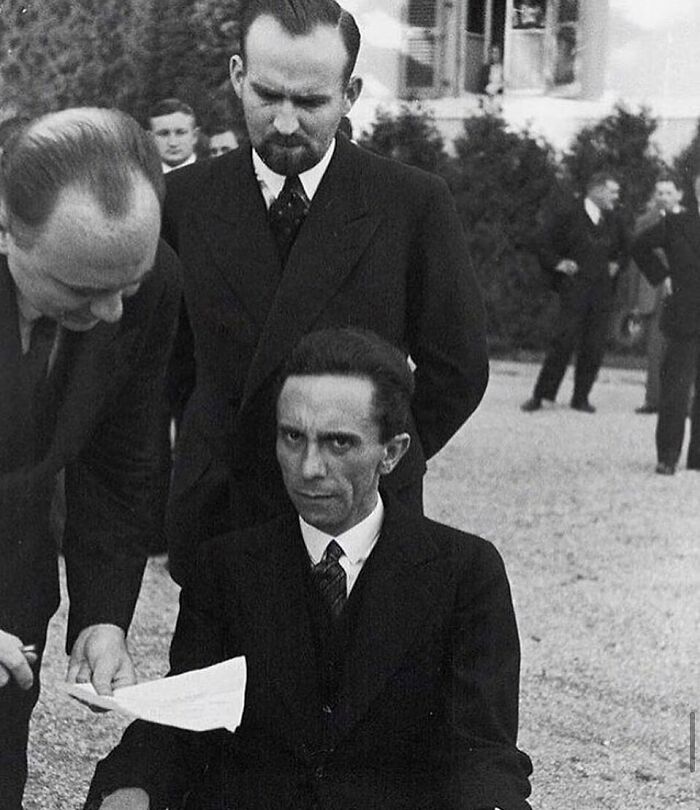
Image credits: historicaleaks
#91 The Headquarters Of Mussolini’s Italian Fascist Party, 1934
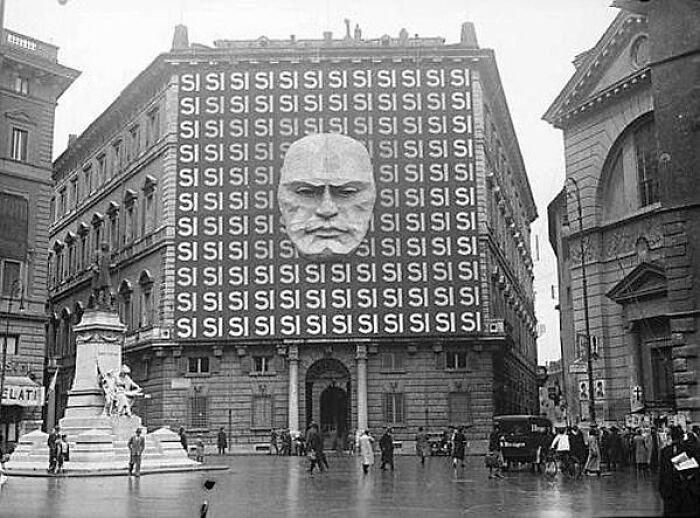
Image credits: historicaleaks
#92 Padaung Women Asking A London Policeman For Directions, 1935
The Kayan are a sub-group of Red Karen (Karenni people), Tibeto-Burman ethnic minority of Myanmar. Girls first start to wear rings when they are around 5 years old. Over the years, the coil is replaced by a longer one and more turns are added. The weight of the brass pushes the collar bone down and compresses the rib cage. The neck itself is not lengthened; the appearance of a stretched neck is created by the deformation of the clavicle. Many Padaung girls have their necks fitted with the first spiral at the age of 5; after 2 years, a second coil is added. Coils are then added until a limit of 21 - 25 is reached. The origin of this custom is shrouded in mystery. Many believe that it is a way to make women less attractive to slave traders. Some think that it’s the tribe's way to protect their throat from tigers. The most commonly accepted theory, however, is that the purpose of the coils to establish cultural identity, one associated with beauty - a long neck is considered a mark of great beauty. In 1935 a group of Padaung women visited London. In the 1930s, circuses and shows were popular in the United Kingdom and the Padaung women, advertised as “giraffe women,” were star attractions, drawing huge crowds
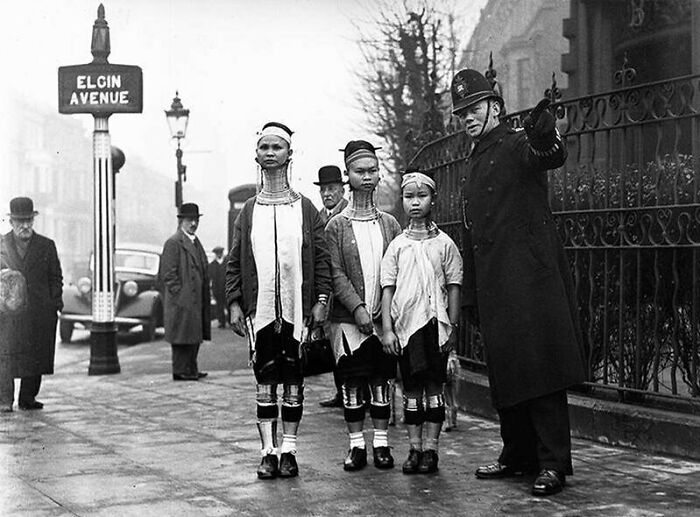
Image credits: historicaleaks
#93 Chichén Itzá When It Was Discovered In 1892 vs. Present Day
Historic accounts differ as to when Chichen Itza was built and ultimately developed into a center of political and economic power. Some accounts place the establishment of the city in the early 400s A.D., while others suggest construction started a few years later, in the middle part of the fifth century. Chichen Itza was a significant center of political and economic activity in the Mayan culture by roughly 600 A.D. Chichen Itza is located about 120 miles from the modern-day resort town of Cancun, on Mexico’s Yucatan Peninsula. The name Chichen Itza is a Mayan language term for “at the mouth of the well of the Itza.” The Itza were an ethnic group of Mayans who had risen to power in the northern part of the Yucatan peninsula, where the city is located. The well in the name refers to a number of underground rivers that run beneath the region and likely served as the source of water for the city. This easy access to water made the location perfect for a city the size of Chichen Itza. El Castillo, also known as the Temple of Kukulcán, is a Mesoamerican step-pyramid that dominates the center of the Chichen Itza archaeological site in the Mexican state of Yucatán. Around the spring and autumn equinoxes, the late afternoon sun strikes off the northwest corner of the pyramid and casts a series of triangular shadows against the northwest balustrade, creating the illusion of the feathered serpent "crawling" down the pyramid. The structure is 24 m (79 ft) high, plus an additional 6 m (20 ft) for the temple at the top. The square base measures 55.3 m (181 ft) across. All four sides of the pyramid have approximately 91 steps which, when added together and including the temple platform on top as the final "step", may produce a total of 365 steps (the steps on the south side of the pyramid are eroded). That number is equal to the number of days of the Haab' year and likely is significantly related to rituals

Image credits: historicaleaks
#94 Pnina Kaltman, Is The Small Girl On The Right. On The Left Is Her Sister. Against All Odds - They Both Survived The Holocaust, Along With Their Mother And Other Sister
They were the only kids who survived the war from their small village next to Chernivtsi, Ukraine. She was four years old when the war started and about 8 years old in this photo. It was taken in 1945, after the Red Army defeated the Nazis and took over their work camp in Obodivka. They survived because there was absolutely nothing their mother wouldn’t do to save their lives. Her name was Sima Perlmutter and she was a hero. Her granddaughter, @noamout said: “My grandmother has been and still is dedicating her life to tell her story to as many people as she can about this — it’s her lifelong project. She wants to make sure people never forget so that it never happens again. She wrote her testimony 16 years ago in Hebrew thinking no one would ever read it. I decided to translate her story to English as a surprise gift for her but then I realized I can do something much bigger than originally planned. Her story is now shared on countless of international Instagram pages, American publications and even going to be featured in a museum in Australia! She has absolutely no idea about any of this. I am taking screenshots of every comment, every story, any kind of mention and translating it to Hebrew. When I tell her about this, I will have fileus of people from all over the world talking about her story.”
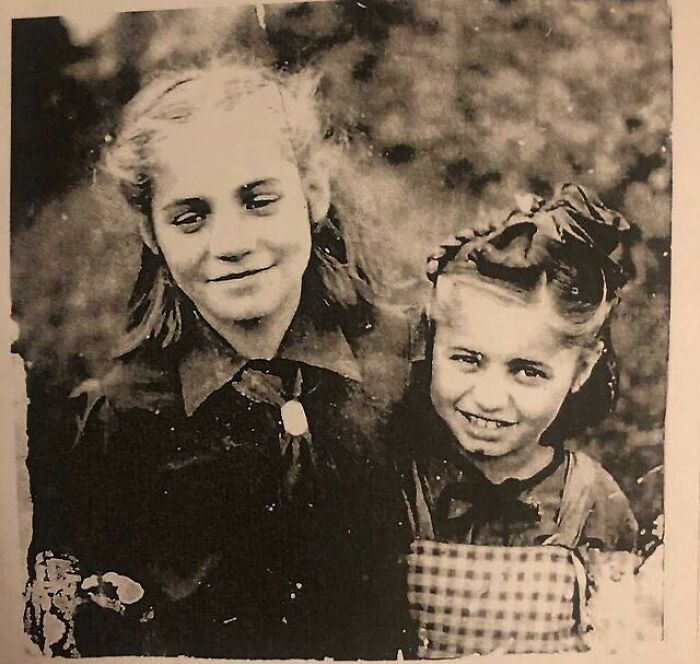
Image credits: historicaleaks
#95 Dubai In 1985 And In 2016

Image credits: historicaleaks
#96 Joanna Capestro (Left) After The Collapse Of The First World Trade Center Tower, 2001
The photographer of this photo was the same at her wedding 17 years later. She had no idea acclaimed photographer Phil Penman had captured the poignant moment she and a shell shocked colleague - coated in thick white dust - staggered away from Ground Zero. But the pair finally met after Penman’s harrowing photos were displayed inside the National September 11 Memorial & Museum.
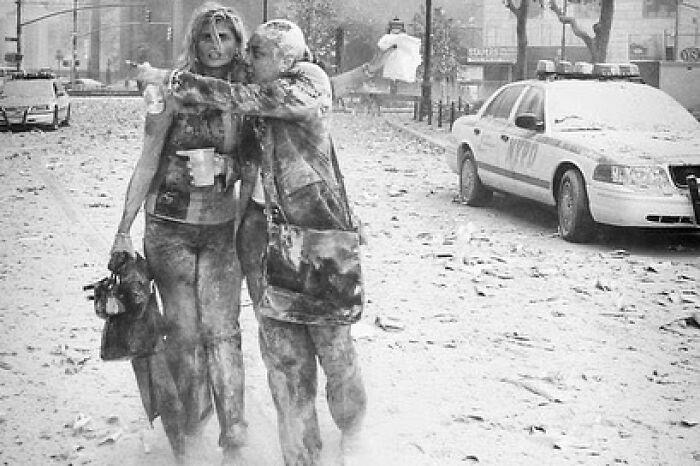
Image credits: historicaleaks
#97 Pictured Is A Girl From The Kiowa Tribe In 1894
Kiowa people are a Native American tribe and an indigenous people of the Great Plains of the United States. They migrated southward from western Montana into the Rocky Mountains in Colorado in the 17th and 18th centuries, and finally into the Southern Plains by the early 19th century. In 1867, the Kiowa were moved to a reservation in southwestern Oklahoma
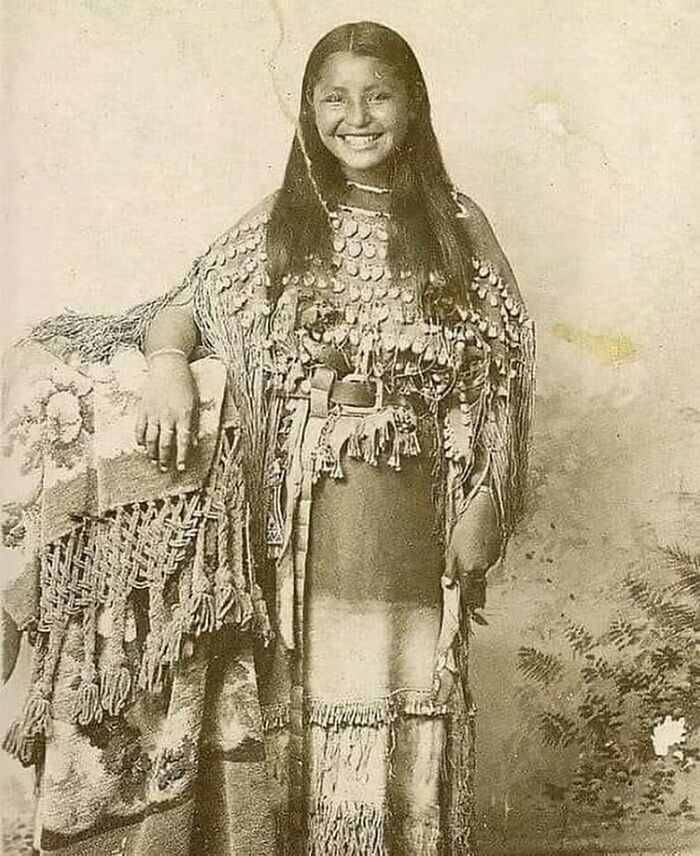
Image credits: historicaleaks
#98 A Serbian Soldier Sleeps With His Father Who Came To Visit Him On The Front Line Near Belgrade, 1914/1915
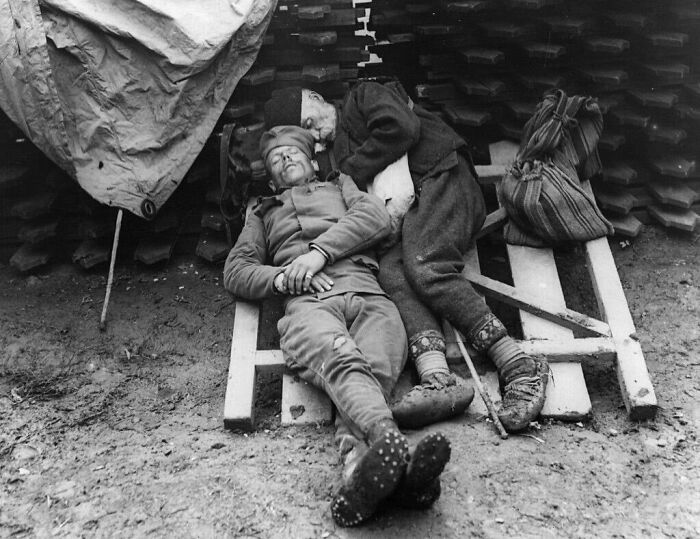
Image credits: historicaleaks
#99 German Soldier Returns To His Wife After War Captivity, Germany, 1945
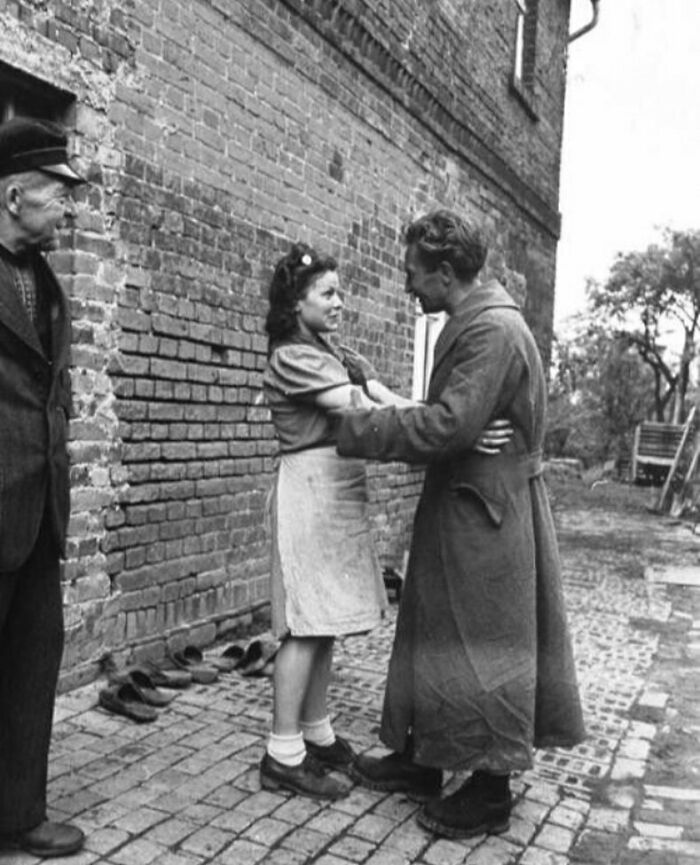
Image credits: historical.leaks
#100 A Couple Kissing In A Pub As They Celebrate The End Of World War II, London, 1945
On September 2, 1945, formal surrender documents were signed, designating the day as the official Victory over Japan Day (V-J Day). U.S. General Douglas MacArthur accepted Japan's formal surrender aboard the U.S. battleship Missouri, anchored in Tokyo Bay along with a flotilla of more than 250 Allied warships
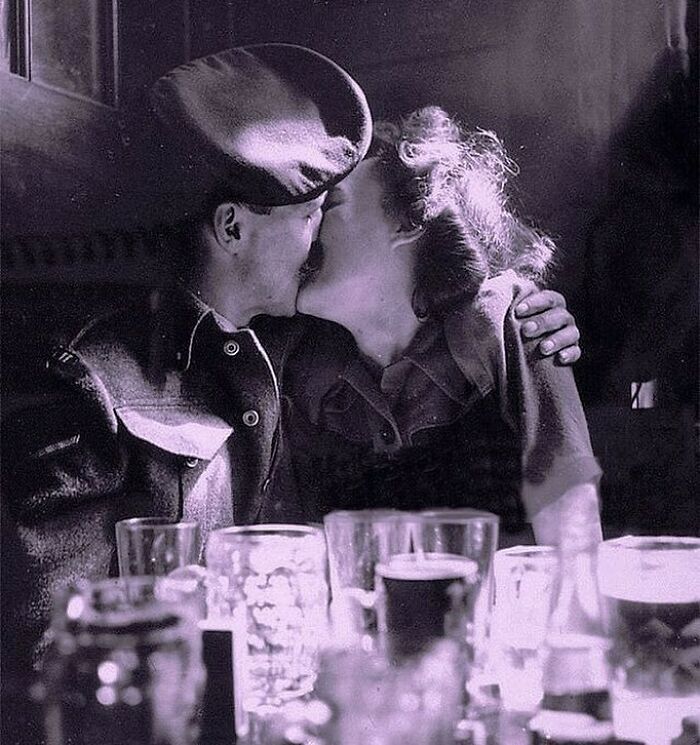
Image credits: historical.leaks
#101 V-J Day In Times Square, A Photograph By Alfred Eisenstaedt, Was Published In Life In 1945
"In New York's Times Square a white-clad girl clutches her purse and skirt as an uninhibited sailor plants his lips squarely on hers.” V-J Day in Times Square is a photograph by Alfred Eisenstaedt that portrays a U.S. Navy sailor embracing and kissing a total stranger—a dental assistant—on Victory over Japan Day ("V-J Day") in New York City's Times Square on August 14, 1945. Eisenstaedt was photographing a spontaneous event that occurred in Times Square during keen public anticipation of the announcement of the end of the war with Japan (that would be made by U.S. President Harry S. Truman at seven o'clock). Eisenstaedt said that he did not have an opportunity to get the names and details, because he was photographing rapidly changing events during the celebrations. The photograph does not clearly show the face of either person involved, and numerous people have claimed to be the subjects. The photograph was shot just south of Forty-fifth Street looking north from a location where Broadway and Seventh Avenue converge. Donald W. Olson and his investigative team estimate that the photograph was taken at 5:51 p.m. ET. In their history pages, Life has noted that the Eisenstaedt photograph was taken with a Leica IIIa camera.
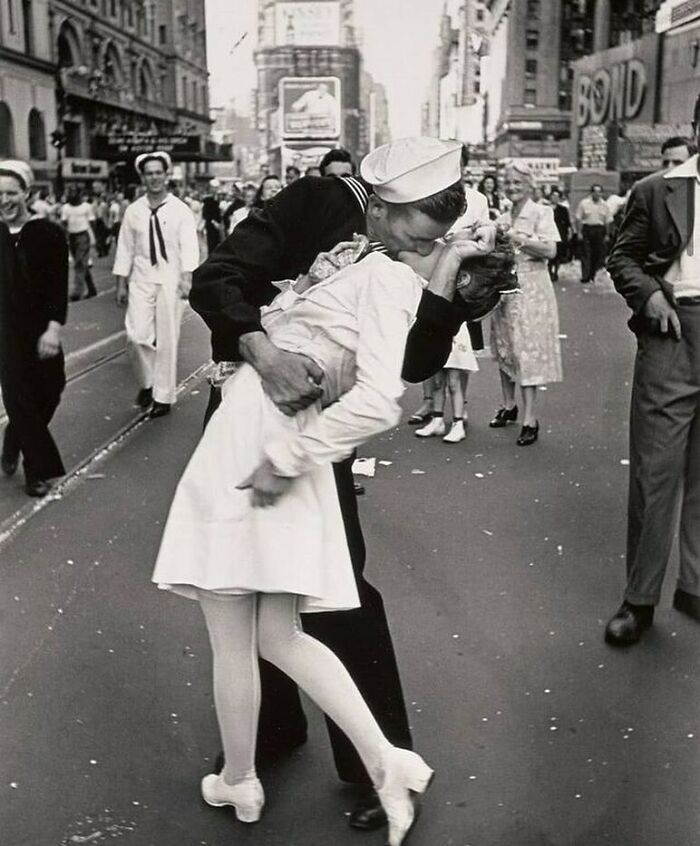
Image credits: historical.leaks
#102 1940s Style
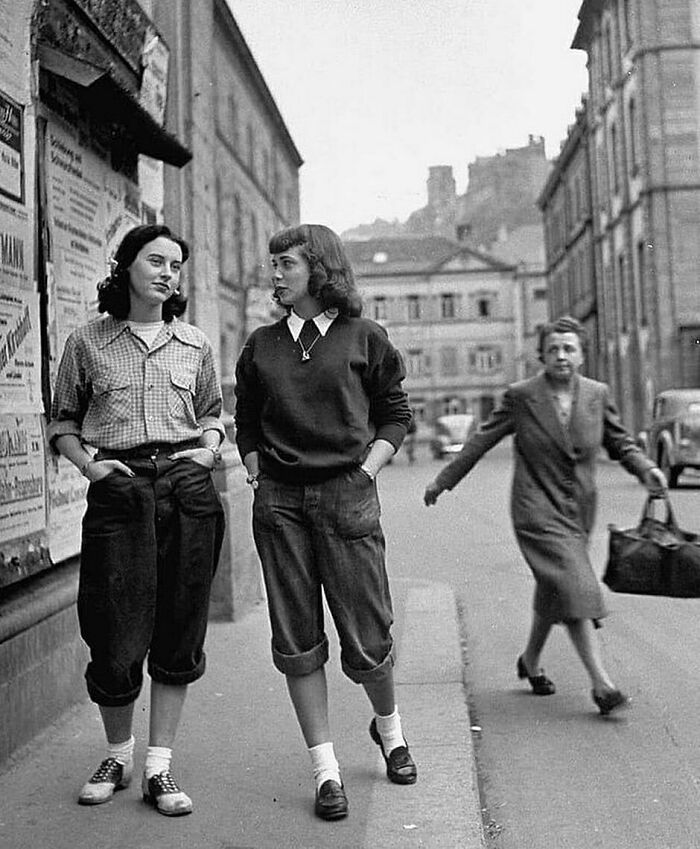
Image credits: historicaleaks
#103 Japanese Samurai In 1866
Samurai, member of the Japanese warrior caste. The term samurai was originally used to denote the aristocratic warriors (bushi), but it came to apply to all the members of the warrior class that rose to power in the 12th century and dominated the Japanese government until the Meiji Restoration in 1868. At the core of the samurai beliefs was their honor code known as bushido, but the bushido code was just the natural result of the three most important religions and philosophies the samurai followed – Shintoism, Confucianism, and Zen Buddhism. The word "bushido" comes from the Japanese roots bushi meaning warrior, and do meaning path or way. It translates literally to way of the warrior. Bushido was followed by Japan's samurai warriors and their precursors in feudal Japan, as well as much of central and east Asia. The principles of bushido emphasized honor, courage, skill in the martial arts, and loyalty to a warrior's master (daimyo) above all else. In the 1870s, samurai comprised five percent of the population, or 400,000 families with about 1.9 million members. In the 1880s, 23 percent of prominent Japanese businessmen were from the samurai class; by the 1920s the number had grown to 35 percent
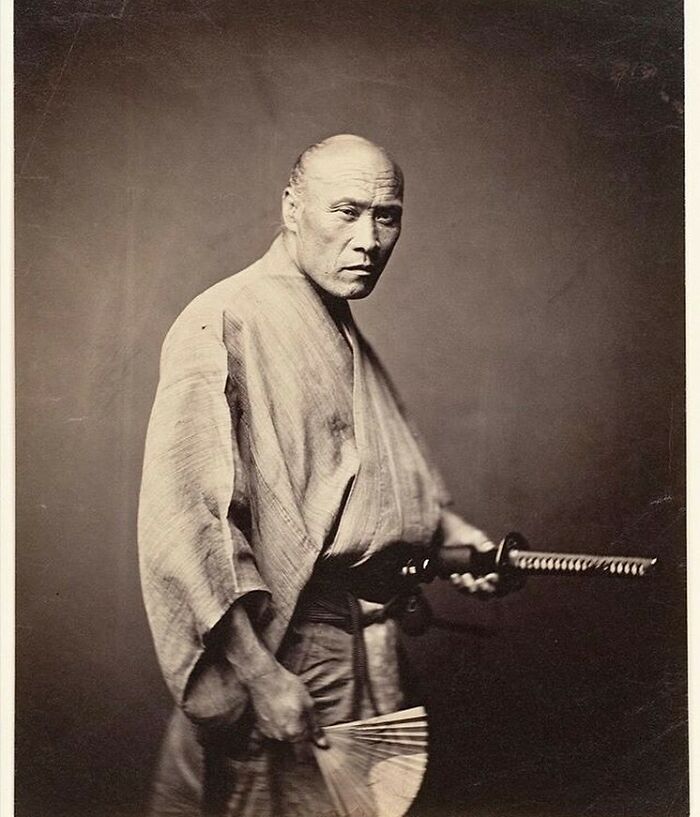
Image credits: historicaleaks
#104 Marine Vietnam Veterans Recreate Photo 50 Years After The Original
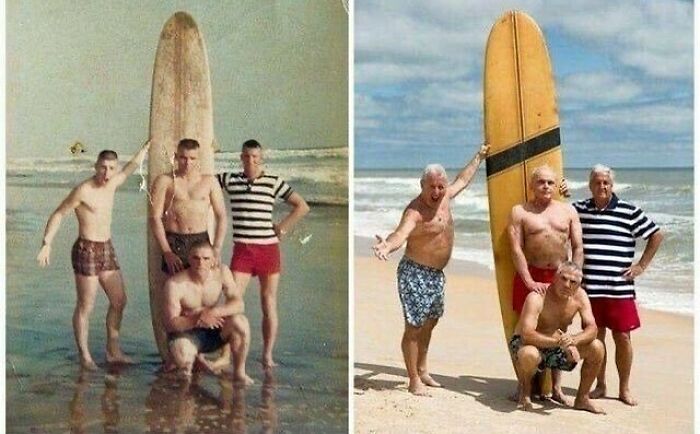
Image credits: historicaleaks
#105 Jack Black In One Of His First Acting Photos, 1988
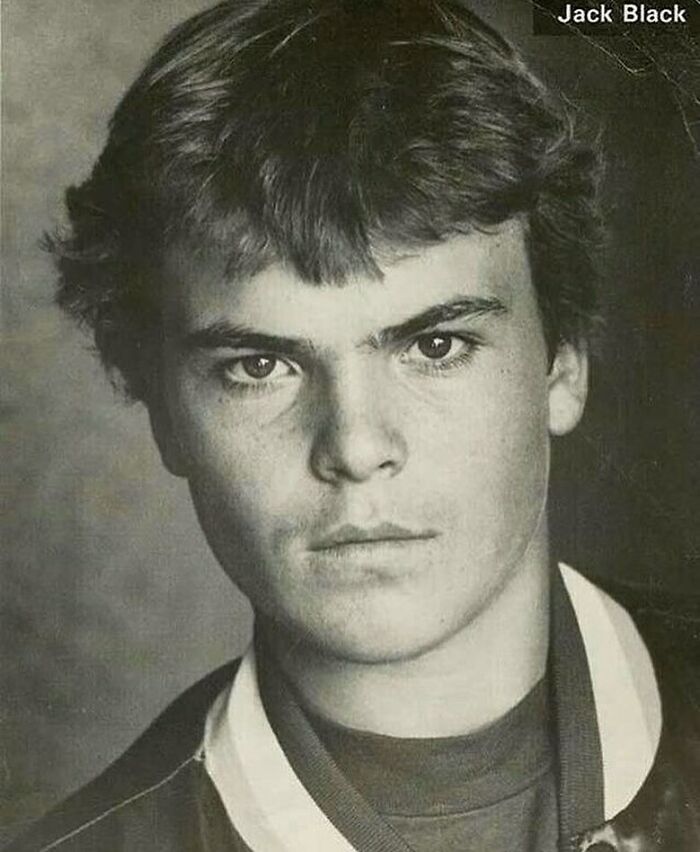
Image credits: historicaleaks
#106 Jim Carrey At Age 19, 1981
During his childhood Jim Carrey was poor, and he and his brother worked as janitors and security guards at a tire factory. At age 16, Jim went to work and started his career as a comedian at the same time. In 2007, Jim said, "If my career in show business hadn't panned out I would probably be working today in Hamilton, Ontario, at the Dofasco steel mill." When he was young, he saw the steel mills on the other side of Burlington Bay and believed that's "where the great jobs were." He said about his father: "My father could have been a great comedian but he didn't believe that that was possible for him, and so he made a conservative choice. Instead, he got a safe job as an accountant and when I was 12 years old he was let go from that safe job, and our family had to do whatever we could to survive. I learned many great lessons from my father. Not the least of which was that: You can fail at what you don't want. So you might as well take a chance on doing what you love."
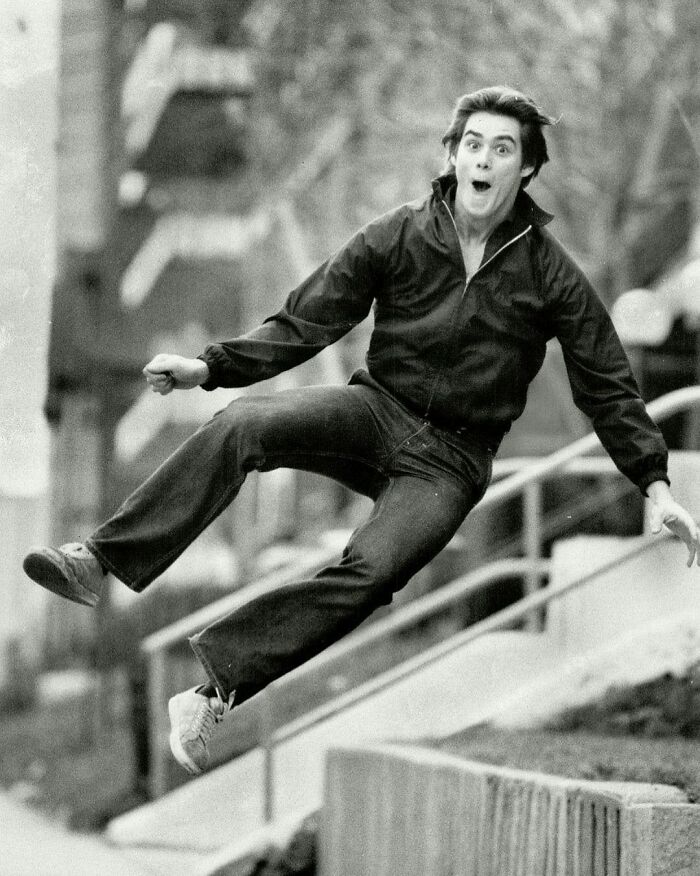
Image credits: historicaleaks
#107 British Veteran Paratroopers In Front Of Their Younger Versions On The Same Plane They Used To Jump Over Normandy In June 1944
Shortly after midnight on 6 June, over 18,000 men of the US 82nd and 101st Airborne Divisions and the British 6th Airborne Division were dropped into Normandy. Allied paratroopers and glider-borne infantry were well trained and highly skilled, but for many this was their first experience of combat. Dropped behind enemy lines to soften up the German troops and to secure needed targets, the paratroopers knew that if the accompanying assault by sea failed — there would be no rescue. Departing from Portland Bill on the English coast, the 101st and 82nd U.S. Airborne Divisions were dropped on the Cherbourg peninsula
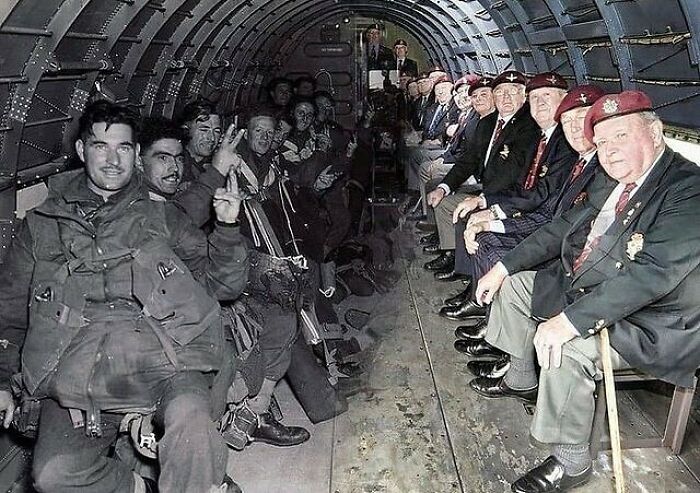
Image credits: historical.leaks
#108 Us Army Nurse, Ready For Her Journey To The Field Hospital, France 1944
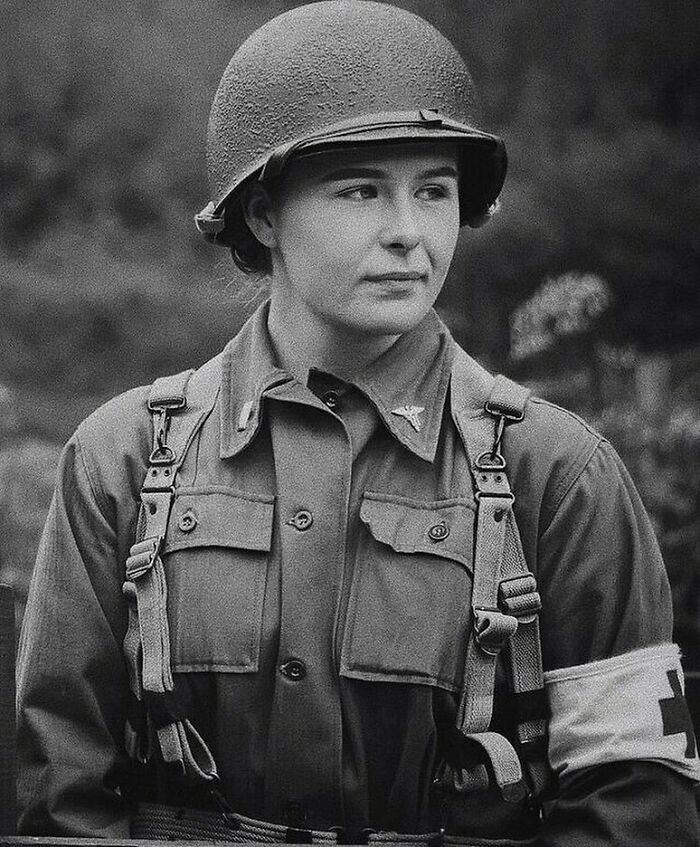
Image credits: historical.leaks
